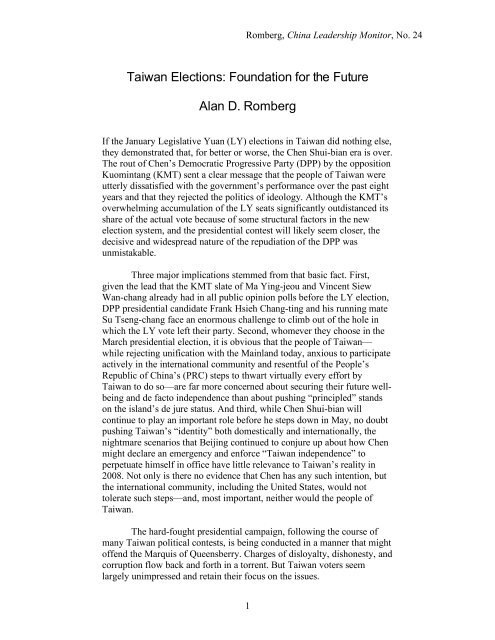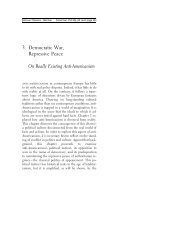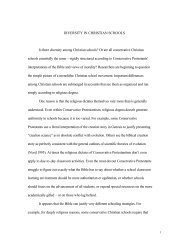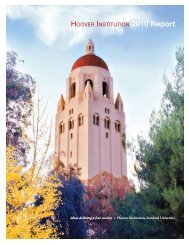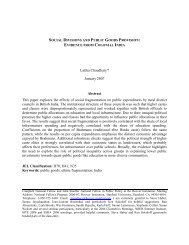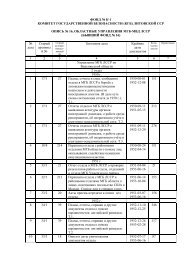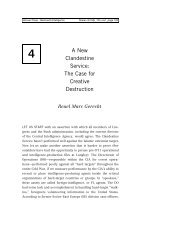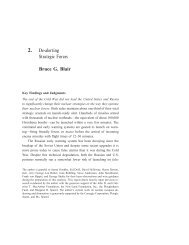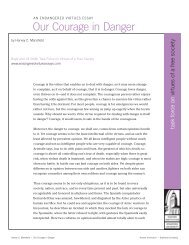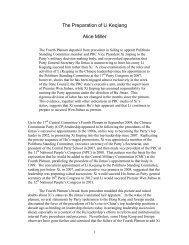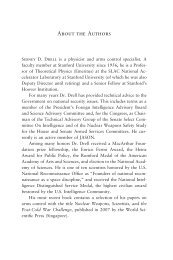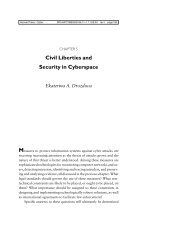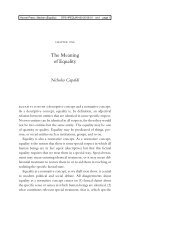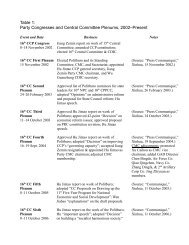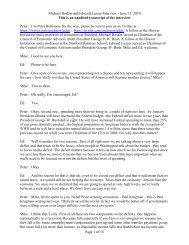Taiwan Elections: Foundation for the Future - Hoover Institution
Taiwan Elections: Foundation for the Future - Hoover Institution
Taiwan Elections: Foundation for the Future - Hoover Institution
You also want an ePaper? Increase the reach of your titles
YUMPU automatically turns print PDFs into web optimized ePapers that Google loves.
Romberg, China Leadership Monitor, No. 24<br />
<strong>Taiwan</strong> <strong>Elections</strong>: <strong>Foundation</strong> <strong>for</strong> <strong>the</strong> <strong>Future</strong><br />
Alan D. Romberg<br />
If <strong>the</strong> January Legislative Yuan (LY) elections in <strong>Taiwan</strong> did nothing else,<br />
<strong>the</strong>y demonstrated that, <strong>for</strong> better or worse, <strong>the</strong> Chen Shui-bian era is over.<br />
The rout of Chen’s Democratic Progressive Party (DPP) by <strong>the</strong> opposition<br />
Kuomintang (KMT) sent a clear message that <strong>the</strong> people of <strong>Taiwan</strong> were<br />
utterly dissatisfied with <strong>the</strong> government’s per<strong>for</strong>mance over <strong>the</strong> past eight<br />
years and that <strong>the</strong>y rejected <strong>the</strong> politics of ideology. Although <strong>the</strong> KMT’s<br />
overwhelming accumulation of <strong>the</strong> LY seats significantly outdistanced its<br />
share of <strong>the</strong> actual vote because of some structural factors in <strong>the</strong> new<br />
election system, and <strong>the</strong> presidential contest will likely seem closer, <strong>the</strong><br />
decisive and widespread nature of <strong>the</strong> repudiation of <strong>the</strong> DPP was<br />
unmistakable.<br />
Three major implications stemmed from that basic fact. First,<br />
given <strong>the</strong> lead that <strong>the</strong> KMT slate of Ma Ying-jeou and Vincent Siew<br />
Wan-chang already had in all public opinion polls be<strong>for</strong>e <strong>the</strong> LY election,<br />
DPP presidential candidate Frank Hsieh Chang-ting and his running mate<br />
Su Tseng-chang face an enormous challenge to climb out of <strong>the</strong> hole in<br />
which <strong>the</strong> LY vote left <strong>the</strong>ir party. Second, whomever <strong>the</strong>y choose in <strong>the</strong><br />
March presidential election, it is obvious that <strong>the</strong> people of <strong>Taiwan</strong>—<br />
while rejecting unification with <strong>the</strong> Mainland today, anxious to participate<br />
actively in <strong>the</strong> international community and resentful of <strong>the</strong> People’s<br />
Republic of China’s (PRC) steps to thwart virtually every ef<strong>for</strong>t by<br />
<strong>Taiwan</strong> to do so—are far more concerned about securing <strong>the</strong>ir future wellbeing<br />
and de facto independence than about pushing “principled” stands<br />
on <strong>the</strong> island’s de jure status. And third, while Chen Shui-bian will<br />
continue to play an important role be<strong>for</strong>e he steps down in May, no doubt<br />
pushing <strong>Taiwan</strong>’s “identity” both domestically and internationally, <strong>the</strong><br />
nightmare scenarios that Beijing continued to conjure up about how Chen<br />
might declare an emergency and en<strong>for</strong>ce “<strong>Taiwan</strong> independence” to<br />
perpetuate himself in office have little relevance to <strong>Taiwan</strong>’s reality in<br />
2008. Not only is <strong>the</strong>re no evidence that Chen has any such intention, but<br />
<strong>the</strong> international community, including <strong>the</strong> United States, would not<br />
tolerate such steps—and, most important, nei<strong>the</strong>r would <strong>the</strong> people of<br />
<strong>Taiwan</strong>.<br />
The hard-fought presidential campaign, following <strong>the</strong> course of<br />
many <strong>Taiwan</strong> political contests, is being conducted in a manner that might<br />
offend <strong>the</strong> Marquis of Queensberry. Charges of disloyalty, dishonesty, and<br />
corruption flow back and <strong>for</strong>th in a torrent. But <strong>Taiwan</strong> voters seem<br />
largely unimpressed and retain <strong>the</strong>ir focus on <strong>the</strong> issues.<br />
1
Romberg, China Leadership Monitor, No. 24<br />
The critical question facing all <strong>the</strong> relevant players after a new<br />
<strong>Taiwan</strong> leader takes office in May will be whe<strong>the</strong>r <strong>the</strong> two sides of <strong>the</strong><br />
Strait can seize <strong>the</strong> opportunity presented by <strong>the</strong> change in Taipei—<br />
whoever is elected—to lay a new foundation <strong>for</strong> <strong>the</strong> future. One wellplaced<br />
Mainland observer assures: “We will certainly not miss this<br />
strategic opportunity.” Assuming that this reflects <strong>the</strong> leadership view, that<br />
approach could foster strong economic ties and reduce tensions, even<br />
while leaving resolution of ultimate political relationships to ano<strong>the</strong>r day.<br />
But one fears that Abba Eban’s quip about those who “never miss an<br />
opportunity to miss an opportunity” might also apply here. If <strong>for</strong> any<br />
reason <strong>the</strong> parties do miss <strong>the</strong> moment, <strong>the</strong>y might well set in concrete a<br />
competitive and even confrontational cross-Strait structure that will<br />
deepen existing tensions, complicate U.S.-PRC relations, and continue to<br />
threaten <strong>the</strong> well-being of all concerned.<br />
The LY Election<br />
On 12 January, KMT candidates <strong>for</strong> <strong>the</strong> Legislative Yuan secured over 53 percent of <strong>the</strong><br />
popular vote compared to <strong>the</strong> DPP’s 39 percent. The roughly 15-point gap was also<br />
reflected in <strong>the</strong> “second” ballot cast by voters, in which <strong>the</strong>y opted <strong>for</strong> <strong>the</strong> party of <strong>the</strong>ir<br />
choice without reference to candidates. 1 With <strong>the</strong> exception of Tainan County, Tainan<br />
City, and Pingtung County, <strong>the</strong> DPP was outpolled in every electoral district on <strong>the</strong><br />
island, even in <strong>the</strong> south, losing in several areas where it had prevailed in 2004. These<br />
results—though not as skewed as <strong>the</strong> seat distribution, where <strong>the</strong> KMT and its allies won<br />
75 percent of <strong>the</strong> LY seats under <strong>the</strong> new single-member district system—were by any<br />
measure a blistering repudiation of <strong>the</strong> DPP government that has been in office over <strong>the</strong><br />
past eight years.<br />
While a KMT victory had been widely anticipated, <strong>the</strong> dimensions of this<br />
outcome were a surprise to everyone. Even accounting <strong>for</strong> its inherent advantage in <strong>the</strong><br />
new single-member districts, <strong>the</strong> KMT itself had been projecting that it would take<br />
somewhere between 70 and 75 seats, with anything in that range considered a substantial<br />
victory. And <strong>the</strong> DPP had been projecting 40–45 seats, with anything below that a<br />
substantial defeat. 2 On <strong>the</strong> eve of <strong>the</strong> election, <strong>the</strong> KMT thought 15 races would be too<br />
close to call 3 and that as many as 10 would be so close (within 0.3 percent) that a recount<br />
would be necessary. 4 Though taking a DPP majority was never in <strong>the</strong> cards, President<br />
Chen had at one point said that KMT control of <strong>the</strong> LY would be a “disaster.” 5 When he<br />
got specific, however, Chen had set a target of 50 DPP seats (still not a majority but close<br />
enough to block a lot of actions), arguing that this was not only attainable but necessary<br />
to provide a solid political base <strong>for</strong> Frank Hsieh’s presidential ef<strong>for</strong>ts in March. 6<br />
In <strong>the</strong> end, <strong>the</strong> KMT secured outright 81 of <strong>the</strong> LY’s 113 seats and, toge<strong>the</strong>r with<br />
allied parties and independents, will control 86 seats, or a crucial three-fourths majority.<br />
The DPP, on <strong>the</strong> o<strong>the</strong>r hand, holds only 27 seats, which its presidential standard-bearer<br />
2
Romberg, China Leadership Monitor, No. 24<br />
Frank Hsieh has dismissed as a “meaningless minority.” 7 Although Hsieh himself was<br />
obviously far from giving up, immediately after <strong>the</strong> LY disaster some DPP members<br />
were already assuming that <strong>the</strong> battle <strong>for</strong> <strong>the</strong> presidency was a lost cause and were<br />
looking ahead to county and mayoral elections at <strong>the</strong> end of 2009 as <strong>the</strong> next opportunity<br />
to begin a comeback. 8<br />
In <strong>the</strong> wake of this outcome, President Chen Shui-bian immediately resigned as<br />
party chairman, calling it “<strong>the</strong> worst setback” in DPP history, <strong>for</strong> which he felt shame and<br />
would shoulder “all of <strong>the</strong> responsibility.” 9<br />
January referenda<br />
Also of interest in this election is <strong>the</strong> fact that <strong>the</strong> two referenda on <strong>the</strong> ballot—a DPP<br />
proposal on return of “illegal” KMT assets and a KMT proposal on rooting out (DPP)<br />
corruption in government—failed to obtain <strong>the</strong> necessary 50 percent total electorate<br />
participation necessary <strong>for</strong> <strong>the</strong>m to be valid.<br />
The Central Election Commission (CEC) had adopted a “one step” procedure, in which<br />
voters would be handed all four ballots <strong>for</strong> candidates and referenda upon entering <strong>the</strong><br />
polling station. The KMT objected strenuously that this skewed <strong>the</strong> process by virtually<br />
ensuring participation levels would clear <strong>the</strong> 50 percent bar, automatically making <strong>the</strong><br />
referenda “valid.” And local KMT leaders said <strong>the</strong>y would not follow <strong>the</strong> CEC’s<br />
instructions in this matter.<br />
But following a heated controversy, in which some local election officials were<br />
suspended 10 and threats of prosecution hung in <strong>the</strong> air, 11 <strong>the</strong> KMT finally decided to end<br />
defiance of <strong>the</strong> CEC ruling and to drop its insistence on using a “two-step” system in<br />
cities and counties it controlled. The party feared that in a continuation of <strong>the</strong><br />
confrontation over procedure <strong>the</strong> KMT would be perceived as a “spoiler” in <strong>the</strong> eyes of<br />
<strong>the</strong> electorate, which could cost it votes, and that continued defiance might threaten social<br />
order and even lay <strong>the</strong> foundation <strong>for</strong> legal challenges by <strong>the</strong> central authorities in an<br />
election that <strong>the</strong> KMT o<strong>the</strong>rwise expected to win. So <strong>the</strong> party accepted <strong>the</strong> proposed<br />
“one step, two tables” system put <strong>for</strong>th by <strong>the</strong> CEC, but <strong>the</strong>n expressed its objection to<br />
what it perceived as <strong>the</strong> inherent unfairness of <strong>the</strong> process by calling <strong>for</strong> a boycott of both<br />
referenda. The entire method, <strong>the</strong> KMT argued, was a DPP election tool being<br />
implemented through <strong>the</strong> CEC to “create chaos and generate conflict.” 12<br />
Since indications were that both proposals would fail anyway, <strong>the</strong> boycott<br />
probably did not change <strong>the</strong> ultimate outcome. But it did play an important part in<br />
ensuring <strong>the</strong> participation of a mere 26 percent of <strong>the</strong> entire electorate in both referenda,<br />
barely half of what was required to validate <strong>the</strong>m. This <strong>the</strong>n set <strong>the</strong> stage <strong>for</strong> <strong>the</strong> much<br />
more important round of referenda, in March, when competing texts about UN<br />
membership will be on <strong>the</strong> ballot. 13<br />
3
Hsieh seizes <strong>the</strong> reins of party leadership<br />
Romberg, China Leadership Monitor, No. 24<br />
It had been evident <strong>for</strong> a long time that Frank Hsieh was chafing at <strong>the</strong> heavy<br />
involvement of Chen Shui-bian in <strong>the</strong> election during <strong>the</strong> period leading up to <strong>the</strong> LY<br />
ballot. Both men claimed publicly that this arrangement was “natural” due to <strong>the</strong> fact that,<br />
as DPP Chair, Chen had an institutional role in <strong>the</strong> LY election, while Hsieh did not (or at<br />
least he chose not to claim one). But <strong>the</strong> president was not only stealing headlines, he was<br />
also setting <strong>the</strong> overall political agenda, and <strong>the</strong> more fundamentalist positions he was<br />
promoting appeared to be alienating <strong>the</strong> moderate center that was crucial to Hsieh’s<br />
success.<br />
Thus, even during <strong>the</strong> LY campaign, Hsieh felt that he could not remain passive,<br />
that he had to take steps to appeal to <strong>the</strong> center. And to do that, he needed to separate<br />
himself from <strong>the</strong> president. At <strong>the</strong> same time, he had to act without seeming to break with<br />
Chen, lest he alienate <strong>the</strong> Green base. So, even be<strong>for</strong>e mid-January he began to take<br />
stands at odds with Chen administration policies on such questions as liberalizing cross-<br />
Strait investment rules, promoting Mainland tourism in <strong>Taiwan</strong>, and expanding cross-<br />
Strait charter flights. He tried to reconcile his policies with Chen’s by calling <strong>the</strong>m<br />
“different but not contradictory,” but he drove home his view that, if <strong>Taiwan</strong> did not<br />
participate more vigorously in <strong>the</strong> Mainland’s economy, it would lose its competitive<br />
edge. And in <strong>the</strong> process, he did not shy away from characterizing his policies as an ef<strong>for</strong>t<br />
to make up <strong>for</strong> <strong>the</strong> “deficiencies” of <strong>the</strong> current administration. 14<br />
While still <strong>for</strong>mally accepting <strong>the</strong> “division of labor,” Hsieh also strove to convey<br />
<strong>the</strong> clear impression that after <strong>the</strong> LY election he would take <strong>the</strong> lead, with Chen moving<br />
into a supporting position. In an ef<strong>for</strong>t to refute suspicions that Chen would maintain<br />
control from behind <strong>the</strong> scenes even after stepping down, Hsieh argued that, if he were<br />
elected, he would become party chairman as well as president, so “How can President<br />
Chen meddle”? 15 Perhaps not totally convinced of his own reasoning, however, Hsieh<br />
took special note of AIT chairman Raymond G. Burghardt’s comment that <strong>the</strong> next<br />
president should not be “boxed in” by <strong>the</strong> actions and statements of <strong>the</strong> current<br />
government. 16<br />
After <strong>the</strong> LY debacle, <strong>the</strong> shift not only became easy, it became necessary. Hsieh<br />
quickly seized <strong>the</strong> initiative—and <strong>the</strong> reins of party power, becoming party chairman and<br />
appointing his closest campaign adviser as secretary-general. In a television interview<br />
less than a week after <strong>the</strong> legislative election, Hsieh minced no words about where<br />
responsibility <strong>for</strong> <strong>the</strong> DPP’s failure lay. Dismissing <strong>the</strong> notion that <strong>the</strong> DPP lost only<br />
because of <strong>the</strong> new election rules, he said that <strong>the</strong> DPP lost primarily because it had not<br />
met <strong>the</strong> expectations of <strong>the</strong> people in governing and had failed to give <strong>the</strong> public a clean<br />
and incorruptible image—all of which pointed <strong>the</strong> finger of blame at Chen. Hsieh even<br />
divulged that he had voted <strong>for</strong> <strong>the</strong> KMT’s anti-corruption referendum on 12 January,<br />
which was clearly aimed at misdeeds by officials in <strong>the</strong> DPP administration and <strong>the</strong> Chen<br />
family. And although Hsieh asserted, as he had on several o<strong>the</strong>r occasions, that he would<br />
always want to consider <strong>the</strong> opinion of Chen Shui-bian, he pointedly noted that he was<br />
now not only <strong>the</strong> candidate but <strong>the</strong> party chair, and <strong>the</strong> initiative and responsibility <strong>for</strong><br />
4
Romberg, China Leadership Monitor, No. 24<br />
success or failure were hence<strong>for</strong>th his. 17 Indeed, he was unambiguous about not caring<br />
much what Chen or o<strong>the</strong>rs thought; what he cared about was “looking after <strong>Taiwan</strong> and<br />
saving <strong>the</strong> people.” 18<br />
In taking control, Hsieh set a tough loyalty test <strong>for</strong> o<strong>the</strong>rs: “From now on,” he<br />
said, “I set <strong>the</strong> party line and everyone has to toe <strong>the</strong> line.” 19 Those who did not follow<br />
his lead would have to leave <strong>the</strong> party. But he also laid down a benchmark <strong>for</strong> himself,<br />
pledging that he would leave politics permanently if he lost. 20<br />
In addition to figuring out what tactics would work best against Ma Ying-jeou,<br />
Hsieh faced two o<strong>the</strong>r important problems. First, despite his obvious ef<strong>for</strong>t to place blame<br />
on Chen <strong>for</strong> <strong>the</strong> LY failure, Hsieh himself was suffering within <strong>the</strong> party from <strong>the</strong> fact<br />
that he had not aggressively helped LY candidates, and had even been responsible <strong>for</strong> <strong>the</strong><br />
defeat in <strong>the</strong> primary campaign of some candidates who might have won in January. DPP<br />
observers thought this had undermined any sense of obligation to Hsieh that <strong>the</strong> rank and<br />
file might o<strong>the</strong>rwise have felt toward <strong>the</strong>ir new leader, and many commented that if this<br />
situation were left unrepaired, it could hurt him in <strong>the</strong> presidential ef<strong>for</strong>t. 21<br />
Hsieh was obviously not oblivious to this situation, and he sought to remedy it. As<br />
he moved to take control, he reached out to various party elements he had previously<br />
seemed to shun, letting it be known that he would count on <strong>the</strong> support of <strong>the</strong> o<strong>the</strong>r<br />
factions and <strong>the</strong> party’s defeated LY candidates to help him win <strong>the</strong> presidency. 22 Implicit<br />
in this, of course, was that <strong>the</strong>y would have a say in policy and a share of <strong>the</strong> spoils<br />
should he win.<br />
The second difficult issue Hsieh faced was <strong>the</strong> UN referendum. As discussed in a<br />
previous issue of CLM, 23 <strong>the</strong> DPP proposal to apply to <strong>the</strong> United Nations “in <strong>the</strong> name<br />
of ‘<strong>Taiwan</strong>’” had caused enormous heartburn both in Beijing and Washington and<br />
generated substantial criticism and pressure on Taipei. In speaking with <strong>for</strong>eign critics,<br />
Hsieh had made no secret of <strong>the</strong> fact that this was not his initiative, but Chen Shui-bian’s.<br />
None<strong>the</strong>less, given Chen’s—and <strong>the</strong> party apparat’s—insistence on staying with it,<br />
Hsieh was constrained in his ef<strong>for</strong>ts to consider alternative approaches (discussed below).<br />
He thus took on <strong>the</strong> role of enthusiastic supporter and even erected a huge UN-shaped<br />
block structure in front of his new Kaohsiung campaign headquarters. Still, what had<br />
originally been viewed as a mobilization tool among a broad swath of <strong>Taiwan</strong>ese<br />
nationalists had already become something of an albatross, reminding voters of <strong>the</strong> way<br />
that Chen Shui-bian had used international status and identity issues <strong>for</strong> partisan purposes<br />
to <strong>the</strong> detriment of <strong>Taiwan</strong>’s o<strong>the</strong>r interests.<br />
Conducting <strong>the</strong> Campaign<br />
Following <strong>the</strong> lopsided LY election results, Frank Hsieh started his campaign in earnest<br />
from a deep deficit, according to virtually every available public opinion poll. Although<br />
<strong>the</strong> gap between Hsieh and Ma Ying-jeou in media polls had previously narrowed to as<br />
little as 12 percent (even less, according to DPP surveys), it had widened again in recent<br />
5
Romberg, China Leadership Monitor, No. 24<br />
months to as much as 20 points or more. As we observed in CLM 23, Ma’s exoneration<br />
by <strong>the</strong> High Court in late December, which upheld <strong>the</strong> lower court’s ruling of his<br />
innocence on <strong>the</strong> charge of misuse of public funds, sent his support rate to astronomical<br />
(and unsustainable) levels, creating a 30–40 percent gap. 24<br />
In fact, <strong>the</strong> 14–15 percent gap both in <strong>the</strong> ballots cast <strong>for</strong> individual candidates<br />
and <strong>for</strong> <strong>the</strong> parties in <strong>the</strong> LY election probably represented a reasonable reflection of <strong>the</strong><br />
actual gap in support that could carry over to <strong>the</strong> election. An unknown factor, however,<br />
arises from <strong>the</strong> fact that <strong>the</strong>re will likely be greater voter turnout <strong>for</strong> <strong>the</strong> presidential<br />
election. Both DPP and KMT analysts would argue that a larger turnout would benefit<br />
<strong>the</strong>ir candidate. However, since younger people and independents are <strong>the</strong> ones more<br />
likely to come out in larger numbers in March after sitting out <strong>the</strong> January election, and<br />
since polls now show those groups favoring Ma, <strong>the</strong> situation would seem to give <strong>the</strong><br />
KMT an advantage, making Hsieh’s task all <strong>the</strong> harder.<br />
In reaching <strong>for</strong> approaches that would turn <strong>the</strong> tables on Ma, Hsieh emphasized a<br />
number of issues discussed below, such as personal integrity and reliability. But in trying<br />
to seize <strong>the</strong> initiative, he not only relied on relentless attacks on Ma, but he also clearly<br />
thought that he would be able to best Ma or perhaps even trap him into making selfdefeating<br />
statements in <strong>the</strong> two scheduled television debates on 24 February and 9 March.<br />
According to most polls after both debates, however, Ma not only maintained his lead,<br />
but he was even seen in most tallies as “winning” <strong>the</strong> debate by a fairly wide margin,<br />
contrary to what most viewers had anticipated ahead of time. 25<br />
Issues<br />
On a number of substantive issues, Ma and Hsieh took positions that were not so<br />
divergent. Both, <strong>for</strong> example, set restoration of trust with <strong>the</strong> United States as a very high<br />
priority. Both sought to ease cross-Strait tensions (though with some important<br />
differences in terms of how to go about it, and how far to go). Both pledged to maintain<br />
defense spending at 3 percent of GDP. And both protested PRC ef<strong>for</strong>ts to thwart<br />
<strong>Taiwan</strong>’s attempts to play a meaningful international role, though, here again, <strong>the</strong>re were<br />
important differences between <strong>the</strong> two candidates. 26<br />
Both said <strong>the</strong>ir goal was an equitable and prosperous society, though <strong>the</strong>y differed<br />
over how to get <strong>the</strong>re, with Hsieh prioritizing employment over growth, and Ma <strong>the</strong><br />
opposite. 27 And as election day neared, <strong>the</strong> economy became an increasingly contentious<br />
issue. 28 Indeed, rhetoric on all issues became more and more heated. 29<br />
But <strong>the</strong> biggest points of difference came in what <strong>the</strong>y wanted <strong>the</strong> voters to<br />
focus on.<br />
6
National Identity and Character vs. <strong>the</strong> Economy<br />
Romberg, China Leadership Monitor, No. 24<br />
Hsieh said that <strong>the</strong>re were two important issues in this election: one was <strong>the</strong> security of<br />
<strong>Taiwan</strong> and national identity; <strong>the</strong> o<strong>the</strong>r was economic policy. As Hsieh put it: “Of <strong>the</strong>se,<br />
our party is attaching greater importance to <strong>the</strong> security and national identity issue. That<br />
is because, unless <strong>the</strong> national security and independence of <strong>the</strong> sovereignty of <strong>the</strong><br />
country called <strong>Taiwan</strong> are ensured, we will not be able to defend <strong>the</strong> freedom of <strong>the</strong><br />
residents of <strong>Taiwan</strong>.” 30<br />
Ma, on <strong>the</strong> o<strong>the</strong>r hand, laid great stress on <strong>the</strong> economy, arguing that “<strong>the</strong> economy is<br />
much more important than o<strong>the</strong>r issues to <strong>the</strong> people,” 31 and <strong>the</strong> polls seemed to back him<br />
up. 32<br />
Even Hsieh’s supporters acknowledged that, while <strong>the</strong>ir candidate had to address<br />
<strong>the</strong> real sense of economic distress felt by people throughout <strong>the</strong> island, concentrating on<br />
such issues did not play to his strength. Thus, he had to find a way to change <strong>the</strong> focus of<br />
<strong>the</strong> campaign to his advantage, as he had done with great success in his quixotic ef<strong>for</strong>t to<br />
win <strong>the</strong> Taipei mayoral race in 2006. Hence, Hsieh has dedicated much of his attention to<br />
discrediting Ma’s standing and credibility. While he didn’t throw Ma entirely “off<br />
message,” he did <strong>for</strong>ce <strong>the</strong> KMT candidate to devote more attention than he would have<br />
wanted to defending his integrity and his commitment to <strong>Taiwan</strong>.<br />
In <strong>the</strong> first prong of his attack, Hsieh sought to undermine confidence in Ma’s<br />
loyalty and to demonstrate that Ma is not fundamentally committed to <strong>Taiwan</strong>’s future<br />
and that he would eventually sell out <strong>Taiwan</strong> to <strong>the</strong> Mainland. He painted Ma with <strong>the</strong><br />
brush of “noble Mainlander” who strove to reassert dominance in <strong>Taiwan</strong> 33 but who was<br />
not committed to <strong>the</strong> island. In this regard, he placed great emphasis on seeking to prove<br />
that Ma not only held a U.S. permanent resident’s permit (or “green card”) in <strong>the</strong> United<br />
States some 30 years ago—as many <strong>Taiwan</strong> students did at <strong>the</strong> time—but that <strong>the</strong> KMT<br />
candidate had not given up that permit. Hsieh charged that, even if Ma was not<br />
technically a citizen of <strong>the</strong> United States, his green card proved that his loyalties were<br />
divided and that he was even prepared to seek refuge in <strong>the</strong> United States if things went<br />
badly in <strong>Taiwan</strong>. 34<br />
Hsieh contrasted his dedication to protecting national security within <strong>the</strong><br />
framework of very carefully tailored cross-Strait policies 35 with what he described as<br />
Ma’s “unlimited opening” policy that allegedly disregarded <strong>the</strong>se matters. “The<br />
upcoming elections are a showdown between identification with <strong>Taiwan</strong> and<br />
identification with China.” 36<br />
Trying to encapsulate all of this, as his campaign slogan Hsieh picked:<br />
“Protecting <strong>Taiwan</strong>, saving democracy, two-party rule and <strong>Taiwan</strong>’s progress.” 37 He<br />
argued that Ma would pursue a policy of “as close strategic ties” with China as it would<br />
have with <strong>the</strong> United States and Japan, and that <strong>the</strong> KMT leader would push <strong>Taiwan</strong> into<br />
“de facto” unification status. From <strong>the</strong>re, Hsieh said, it would “not be difficult” to seek de<br />
7
Romberg, China Leadership Monitor, No. 24<br />
jure unification, given <strong>the</strong> KMT’s absolute majority in <strong>the</strong> LY. And in <strong>the</strong> process, he<br />
charged, Ma would abandon <strong>the</strong> opportunity to boost <strong>Taiwan</strong>’s security <strong>for</strong>ces. 38<br />
On his second line of attack, <strong>the</strong> DPP standard-bearer lodged a dizzying<br />
succession of charges of impropriety not only against Ma, but against his wife, sister, and<br />
daughter, all ostensibly reflecting on Ma’s character and suggesting illegality in his<br />
behavior. 39 Even when <strong>the</strong> High Court affirmed Ma’s “not guilty” verdict over misuse of<br />
funds, Hsieh found a basis <strong>for</strong> charging Ma with moral turpitude: “The court ruling only<br />
reflects <strong>the</strong> fact that Ma lied about <strong>the</strong> use of <strong>the</strong> fund and his morals and credibility are<br />
bankrupt,” he said. 40<br />
Although polls suggested that voters were not being swayed in large numbers by<br />
Hsieh’s charges—ei<strong>the</strong>r with respect to <strong>the</strong> attacks on Ma’s, and his family’s, personal<br />
character, or with respect to attacks on various of his policies—Ma’s campaign<br />
developed a “war room” approach. Remembering <strong>the</strong> lackluster ef<strong>for</strong>t in 2004 to counter<br />
Chen Shui-bian’s effective campaign tactics, this time <strong>the</strong>y geared <strong>the</strong>mselves up to<br />
respond quickly—hopefully within <strong>the</strong> same news cycle—to opposition attacks. When<br />
Hsieh confronted Ma on his proposal <strong>for</strong> a major construction program, <strong>for</strong> example,<br />
KMT campaign headquarters called a press conference <strong>the</strong> same day to rebut <strong>the</strong> DPP<br />
candidate’s points one by one, employing a bit of sarcasm reminiscent of some American<br />
political campaigns: “Mr. Frank Hsieh’s aides should work a little bit harder and provide<br />
<strong>the</strong>ir boss with accurate in<strong>for</strong>mation to save him from <strong>the</strong> embarrassment of making<br />
unfounded accusations every day.” 41<br />
The entire identity issue was of sufficient importance to Ma that he spent a good<br />
deal of time in <strong>the</strong> 24 February TV debate underscoring his total identification with<br />
<strong>Taiwan</strong>: “I am <strong>Taiwan</strong>ese. I am a <strong>Taiwan</strong>ese who grew up in Wanhua. 42 I am a<br />
<strong>Taiwan</strong>ese who grew up eating <strong>Taiwan</strong>ese rice and drinking <strong>Taiwan</strong>ese water. I want to<br />
act as an upright <strong>Taiwan</strong>ese, and I will be buried in this land. I gave up my job in <strong>the</strong> US<br />
and I gave up my green card. Nothing will change my love <strong>for</strong> <strong>Taiwan</strong>.” 43<br />
To underscore that he would not betray <strong>Taiwan</strong>’s interests, in mid-January Ma<br />
adopted what he termed a policy of “no unification, no independence, and no use of<br />
<strong>for</strong>ce.” 44 “No independence” was a reiteration of Ma’s—and <strong>the</strong> KMT’s—consistent<br />
opposition to any steps toward de jure independence. “No unification” was a pledge not<br />
only that Ma would not move to unification during his term of office but also that he<br />
would not even discuss it with Beijing. 45 As to <strong>the</strong> “no use of <strong>for</strong>ce,” that, of course,<br />
really depended on Beijing, but it was reasonable to assume that <strong>the</strong> “no independence”<br />
pledge would help guarantee that <strong>for</strong>ce would not be used.<br />
Be<strong>for</strong>e leaving this topic, it does need to be said that unedifying charges against<br />
Hsieh also began to surface from <strong>the</strong> KMT side, including that he had been a “stool<br />
pigeon” against democracy advocates during <strong>the</strong> martial law period, 46 that his wife had<br />
been known <strong>for</strong> her dubious money-raising practices on his behalf in sou<strong>the</strong>rn <strong>Taiwan</strong>, 47<br />
and that he had engaged in o<strong>the</strong>r illicit activities. 48 As with Ma, even though <strong>the</strong> charges<br />
8
Romberg, China Leadership Monitor, No. 24<br />
were vigorously denied, a certain amount of political mud stuck. Still, <strong>the</strong>y didn’t seem to<br />
be playing an overwhelming role in people’s choices. 49<br />
“Balance” in Government . . .<br />
Seeking to bolster his appeal along yet ano<strong>the</strong>r dimension, and in light of <strong>the</strong><br />
overwhelming KMT control of <strong>the</strong> Legislative Yuan, Hsieh emphasized <strong>the</strong> importance<br />
of “balancing” political power. He argued not just that one-party dominance was<br />
undesirable in principle, but, consistent with his argument about <strong>the</strong> potential <strong>for</strong> “sellout,”<br />
that a KMT victory in March would produce a one-party autocracy that harkened<br />
back to <strong>the</strong> days of repressive rule and would threaten <strong>Taiwan</strong>’s democracy. Moreover,<br />
while on <strong>the</strong> one hand he tried to show his “reasonableness” toward <strong>the</strong> Mainland by<br />
arguing that his cross-Strait policies were quite similar to Ma’s in most respects, 50 Hsieh<br />
none<strong>the</strong>less pressed his point that <strong>the</strong> election was crucial to determining <strong>Taiwan</strong>’s future<br />
direction and that a DPP victory was necessary to ensure that <strong>Taiwan</strong> would never<br />
become part of <strong>the</strong> PRC. 51<br />
. . . vs. Effective Government.<br />
Unsurprisingly, Ma argued <strong>the</strong> merits of unified governance, with one party controlling<br />
<strong>the</strong> legislature and <strong>the</strong> executive branch. He said that, while <strong>the</strong> LY victory gave <strong>the</strong><br />
KMT a “clear mandate,” <strong>the</strong> party would be modest, cautious, and discreet, not<br />
complacent or haughty. 52 He pointed to numerous checks and balances in <strong>the</strong> system<br />
against abuse of power, <strong>the</strong> ultimate one being <strong>the</strong> next election. 53 At <strong>the</strong> same time, he<br />
and o<strong>the</strong>r party leaders argued, unified government presented some significant<br />
advantages: “Only by seizing <strong>the</strong> presidency can <strong>the</strong> KMT hold both executive and<br />
legislative powers to effectively rule <strong>the</strong> country and to shoulder complete administrative<br />
responsibilities.” 54<br />
As Ma reiterated his long-standing position about seeking to end <strong>the</strong> state of<br />
hostilities and conclude a peace agreement, he also sought to rebut Hsieh’s charge that he<br />
would be weak on defense.While cautioning against an arms race or adoption of<br />
provocative measures, he reasserted that “all missiles” targeting <strong>Taiwan</strong> must be removed<br />
be<strong>for</strong>e any peace accord could be concluded 55 and called <strong>for</strong> stronger <strong>Taiwan</strong> defense<br />
<strong>for</strong>ces: “We advocate establishing a ‘Hard ROC’ defensive stance by building an<br />
integrated defensive capability that will make it impossible to scare us, blockade us,<br />
occupy us, or wear us down.” 56 He reiterated his determination to procure necessary<br />
advanced weapons systems, including F-16C/D fighter aircraft, which <strong>the</strong> United States<br />
has refused even to consider during Chen Shui-bian’s tenure. And while Hsieh pledged<br />
not to develop any offensive weapons, Ma indicated he might consider acquisition of<br />
conventional offensive weapons depending on <strong>the</strong>ir “nature.” 57<br />
According to polls, Ma was getting <strong>the</strong> best of this argument. For one thing,<br />
having lived through eight years of divided government, <strong>the</strong> public was not buying <strong>the</strong><br />
9
Romberg, China Leadership Monitor, No. 24<br />
case <strong>for</strong> “balancing.” 58 Nor did <strong>the</strong>y seem to find <strong>the</strong> arguments against Ma’s “sell-out”<br />
economic policies convincing. 59 Instead, <strong>the</strong>y seemed largely persuaded by Ma’s<br />
assertion that “if one-party dominance can achieve effectiveness, integrity, and<br />
pragmatism in <strong>the</strong> Legislative Yuan, it is actually good <strong>for</strong> <strong>Taiwan</strong>. It means it has a very<br />
effective government.” 60<br />
The Referendum Issue<br />
Hovering above all else was <strong>the</strong> continuing issue of <strong>the</strong> competing referenda on joining<br />
<strong>the</strong> United Nations.<br />
In late December, in <strong>the</strong> face of increasingly outspoken U.S. opposition to <strong>the</strong><br />
DPP referendum, Hsieh argued that <strong>the</strong> nation should continue to pursue its goal of being<br />
recognized as an independent nation under <strong>the</strong> name “<strong>Taiwan</strong>” in <strong>the</strong> international<br />
community. 61 He claimed that it was impossible to stop <strong>the</strong> referendum just because<br />
“someone is opposed to it” and pledged to patch things up with <strong>the</strong> United States after <strong>the</strong><br />
election. Articulating a line he would come back to at various points throughout <strong>the</strong><br />
remainder of <strong>the</strong> campaign, Hsieh argued that failure to pass <strong>the</strong> referendum would send<br />
a wrong signal to <strong>the</strong> world that <strong>the</strong> people of <strong>Taiwan</strong> really did not care about<br />
international standing or representation.<br />
Still, over <strong>the</strong> next few weeks, and especially after <strong>the</strong> LY election, it became<br />
obvious to Hsieh not only that <strong>the</strong> referendum could well fail, but that, ra<strong>the</strong>r than being a<br />
boost to voter support <strong>for</strong> <strong>the</strong> DPP, it could actually be a net drag on his campaign. He<br />
thus explored a variety of ways to defuse it as a negative factor while still striving to<br />
avoid <strong>the</strong> referendum’s defeat at <strong>the</strong> polls. He considered possibly melding <strong>the</strong> two<br />
referenda, 62 changing <strong>the</strong> wording, 63 postponing <strong>the</strong>m both, 64 <strong>for</strong>ging a possible “third”<br />
referendum jointly drafted and sponsored in <strong>the</strong> LY, 65 or even a having a “defensive<br />
referendum” introduced by <strong>the</strong> president. 66 Finally, when all else failed, he called on<br />
everyone to vote <strong>for</strong> both referenda, 67 a position he maintained through <strong>the</strong> remainder of<br />
<strong>the</strong> campaign. He argued that both parties should join hands in this endeavor to “do<br />
something good <strong>for</strong> <strong>Taiwan</strong>” and urged that <strong>the</strong> KMT not issue a call <strong>for</strong> boycott as it had<br />
done in January. 68<br />
Despite his previous castigation of <strong>the</strong> KMT referendum, and <strong>the</strong> sharp line he<br />
drew between it and <strong>the</strong> DPP’s proposal, Chen Shui-bian eventually endorsed <strong>the</strong> idea of<br />
voting <strong>for</strong> both referenda, 69 even calling success of <strong>the</strong> referenda more important than<br />
whe<strong>the</strong>r Hsieh was elected. 70 However, at virtually <strong>the</strong> last minute, Chen proposed a<br />
“compromise,” in which he would support separation of <strong>the</strong> presidential balloting from<br />
consideration of <strong>the</strong> referenda if <strong>the</strong> KMT-controlled LY would amend <strong>the</strong> Referendum<br />
Law to lower <strong>the</strong> 50 percent participation bar. 71 Hsieh endorsed <strong>the</strong> approach. 72<br />
The KMT rejected all of <strong>the</strong>se approaches. Not only was it adamant in its<br />
opposition to a “third referendum” originating ei<strong>the</strong>r in <strong>the</strong> LY or as a presidential<br />
“defensive referendum,” 73 but it was totally unpersuaded by <strong>the</strong> argument about voting<br />
10
Romberg, China Leadership Monitor, No. 24<br />
<strong>for</strong> both referenda in order to “do something good <strong>for</strong> <strong>Taiwan</strong>.” Ra<strong>the</strong>r, <strong>the</strong> party saw this<br />
as an ef<strong>for</strong>t by Hsieh to do something good <strong>for</strong> his own election prospects, and <strong>the</strong> KMT<br />
leaders made clear <strong>the</strong>y had no intention of cooperating. Moreover, <strong>the</strong>y asked why, as a<br />
matter of principle, <strong>the</strong>y should <strong>the</strong>y accept a “compromise” that entailed voting <strong>for</strong> <strong>the</strong><br />
DPP text. After all, while <strong>the</strong> KMT supported <strong>Taiwan</strong>’s participation in <strong>the</strong> United<br />
Nations, it had only proposed its version of a referendum on <strong>the</strong> topic in order to counter<br />
<strong>the</strong> DPP version; had <strong>the</strong> latter never been proposed, <strong>the</strong> KMT would not have made this<br />
<strong>the</strong> topic of a referendum on its own.<br />
Although <strong>the</strong>y favored deferment of both referenda, 74 <strong>the</strong>y had been rebuffed by<br />
<strong>the</strong> CEC, which decided on 1 February, on a 6-4 split vote, that <strong>the</strong> two UN referenda<br />
would be voted on alongside <strong>the</strong> presidential election on 22 March. In <strong>the</strong>ory, <strong>the</strong> CEC<br />
could reverse itself, or a new CEC could be appointed that was willing to take this on.<br />
Thus, when Chen Shui-bian proposed his “deal” involving lowering <strong>the</strong> Referendum Law<br />
bar in exchange <strong>for</strong> supporting postponing <strong>the</strong> referenda, <strong>the</strong> KMT rejected what it<br />
considered <strong>the</strong> politicization of <strong>the</strong> issue. 75<br />
Given all of <strong>the</strong> factors already discussed, and although discussion of “doing<br />
something” was still going on in early March, it seemed very unlikely that <strong>the</strong> referenda<br />
vote would be postponed. 76<br />
The CEC also announced that <strong>the</strong> “one step, two tables procedure” followed in<br />
January would be used again in March. 77 The KMT denounced <strong>the</strong> decision as an<br />
exercise designed to “hijack elections with referendums” and said it would decide on<br />
fur<strong>the</strong>r action (i.e., whe<strong>the</strong>r to boycott) in <strong>the</strong> days ahead. 78 Several KMT members<br />
argued strongly <strong>for</strong> ano<strong>the</strong>r referendum boycott, and KMT chairman Wu Poh-hsiung<br />
made known that <strong>the</strong> party would announce its decision 10 days be<strong>for</strong>e <strong>the</strong> election, and<br />
would explain its rationale fully. Ma reiterated previous assurances that he would respect<br />
<strong>the</strong> party’s decision. 79<br />
Although it seemed certain that a KMT boycott would ensure <strong>the</strong> defeat of <strong>the</strong><br />
referenda, <strong>the</strong> party was somewhat leery about repeating <strong>the</strong> January call <strong>for</strong> one out of<br />
concern that Hsieh would charge it was “abandoning” <strong>Taiwan</strong>. That said, by indicating<br />
that it was still considering an LY resolution on <strong>the</strong> UN membership issue—not a<br />
referendum, but a non-binding bill that would express <strong>the</strong> LY’s support <strong>for</strong> participation<br />
in <strong>the</strong> United Nations 80 —<strong>the</strong> KMT seemed to be laying <strong>the</strong> groundwork <strong>for</strong> neutralizing<br />
<strong>the</strong> “abandonment” charge and thus being able to call <strong>for</strong> a boycott. Perhaps anticipating<br />
this, and despite <strong>the</strong> fact that Hsieh had said that, though it could not substitute <strong>for</strong> a<br />
referendum, a resolution would be all right with him, 81 <strong>the</strong> DPP’s LY caucus earlier had<br />
come out in opposition to any such resolution if it used <strong>the</strong> name “ROC.” 82 The KMT<br />
proposal reportedly avoided that pitfall, 83 but it was far from clear that <strong>the</strong> DPP would in<br />
<strong>the</strong> end back consideration of <strong>the</strong> resolution, which would be necessary to bring it to a<br />
vote be<strong>for</strong>e <strong>the</strong> election.<br />
Thus, with <strong>the</strong> election less than three weeks away as this essay is being put into<br />
final <strong>for</strong>m, <strong>the</strong> most likely scenario would seem to be that <strong>the</strong> two separate party-<br />
11
Romberg, China Leadership Monitor, No. 24<br />
sponsored referenda will be on <strong>the</strong> ballot alongside <strong>the</strong> presidential vote, <strong>the</strong> KMT will<br />
sponsor a resolution in <strong>the</strong> LY (even if it cannot be brought to a vote in <strong>the</strong> LY due to<br />
DPP opposition) expressing <strong>the</strong> sentiment of <strong>the</strong> people of <strong>Taiwan</strong> that <strong>the</strong>y deserve to be<br />
represented in <strong>the</strong> United Nations and o<strong>the</strong>r international bodies, and <strong>the</strong> KMT will once<br />
again call <strong>for</strong> a boycott of <strong>the</strong> referenda as it did in January. The outcome will be <strong>the</strong><br />
failure of both referenda. Indeed, even without a KMT call <strong>for</strong> a boycott, it is quite<br />
unlikely that ei<strong>the</strong>r referendum is destined to succeed, 84 but <strong>the</strong> boycott would put <strong>the</strong><br />
final nail in <strong>the</strong> coffin.<br />
PRC reactions<br />
As <strong>the</strong>y have throughout <strong>the</strong> LY and presidential campaigns, PRC officials have carefully<br />
refrained from commenting on <strong>the</strong> elections <strong>the</strong>mselves, focusing primarily on what <strong>the</strong>y<br />
still characterize as <strong>the</strong> “period of high danger” not only leading up to 22 March, but<br />
especially between <strong>the</strong>n and 20 May, when Chen Shui-bian is to step down from office.<br />
The LY election result certainly provided a degree of com<strong>for</strong>t to Beijing that <strong>the</strong> people<br />
of <strong>Taiwan</strong> had not abandoned <strong>the</strong>ir embrace of <strong>the</strong> status quo and <strong>the</strong>ir rejection of any<br />
sort of adventurism. But Beijing continued to be worried, first, about <strong>the</strong> fate of <strong>the</strong> two<br />
UN referenda—obviously <strong>the</strong> DPP’s more than <strong>the</strong> KMT’s, but both would be<br />
unacceptable—and, second, about what Chen might do in <strong>the</strong> two-month period after <strong>the</strong><br />
election, when he no longer had to worry about damaging <strong>the</strong> chances of <strong>the</strong> DPP<br />
candidates. 85<br />
PRC analysts could read <strong>the</strong> polls as well as anyone else, and <strong>the</strong>y saw <strong>the</strong> drop in<br />
support <strong>for</strong> <strong>the</strong> referenda and <strong>the</strong> rejection of ideological politics. But <strong>the</strong>y still fretted<br />
that something could happen to push <strong>the</strong> “participation” rate over <strong>the</strong> magic 50 percent<br />
mark, and so <strong>the</strong>y hoped <strong>the</strong> KMT would call a boycott. At <strong>the</strong> same time, recognizing<br />
<strong>the</strong> potential hazard <strong>for</strong> <strong>the</strong> KMT in doing that, <strong>the</strong>y lacked confidence in <strong>the</strong> outcome.<br />
Moreover, Mainland officials and experts alike expressed continuing concern that<br />
<strong>the</strong> United States was not “doing” anything significant to back up its statements against<br />
<strong>the</strong> DPP referendum. They worried that <strong>Taiwan</strong> voters might think <strong>the</strong> U.S. rhetorical<br />
position was simply <strong>for</strong> show, and that <strong>the</strong>y could pass <strong>the</strong> referendum without cost to<br />
<strong>the</strong>ir American ties. Secretary of State Condoleezza Rice’s various statements provided a<br />
certain level of reassurance on this score, but <strong>the</strong>y still pointed to arms sales and o<strong>the</strong>r<br />
relationships that were sending “a wrong signal.” 86<br />
Even so, it was clear that thought was being given to changes that would be<br />
possible in cross-Strait relations once a new leader was seated in Taipei. Xu Shiquan,<br />
vice chairman of <strong>the</strong> National Society of <strong>Taiwan</strong> Studies, told <strong>Taiwan</strong> reporters in mid-<br />
December that Beijing would adopt a policy that was positive, active, flexible, and<br />
showing goodwill. Beijing would certainly open <strong>the</strong> door wide to <strong>Taiwan</strong>, he said;<br />
whe<strong>the</strong>r Taipei walked through it would be up to <strong>the</strong> new leader. 87<br />
12
Romberg, China Leadership Monitor, No. 24<br />
In <strong>the</strong> meantime, at a New Year’s celebration, President Hu Jintao stuck to<br />
standard positions about striving <strong>for</strong> peace but never compromising on opposition to<br />
“<strong>Taiwan</strong> independence,” 88 positions he reiterated in extensive remarks to <strong>Taiwan</strong>-related<br />
participants attending <strong>the</strong> National Committee of <strong>the</strong> Chinese People’s Political<br />
Consultative Conference in early March. 89 But, interestingly, when Secretary Rice visited<br />
Beijing in February 2008, Hu said: “In particular, ef<strong>for</strong>ts will be made to prudently<br />
handle <strong>the</strong> <strong>Taiwan</strong> issue, resolutely deter <strong>the</strong> adventurist activities of ‘<strong>Taiwan</strong><br />
independence’ separatist <strong>for</strong>ces, safeguard peace and stability in <strong>the</strong> <strong>Taiwan</strong> Strait and <strong>the</strong><br />
Asia-Pacific region, and ensure <strong>the</strong> sustained, sound and stable development of<br />
constructive and cooperative ties between China and <strong>the</strong> United States.” 90<br />
While this hardly constituted a pledge not to use whatever means were seen to be<br />
appropriate and necessary should <strong>Taiwan</strong> challenge PRC “red lines” on separatism, it<br />
seemed ra<strong>the</strong>r pointedly intended to reassure <strong>the</strong> United States, including publicly, that it<br />
need not fear Beijing would “overreact” to developments on <strong>the</strong> island.<br />
Beijing maintained that it did not favor one candidate over <strong>the</strong> o<strong>the</strong>r. As we have<br />
discussed in earlier CLM essays, this is probably not strictly true. Since he would<br />
immediately accept “one China, respective interpretations” (<strong>the</strong> KMT’s version of <strong>the</strong><br />
“1992 Consensus”), even though not accepting <strong>the</strong> PRC definitions or doing everything<br />
<strong>the</strong> Mainland would prefer, Ma Ying-jeou would clearly be easier <strong>for</strong> Beijing to deal with<br />
on this core issue. But what probably is true is that <strong>the</strong> outcome of <strong>the</strong> election was less<br />
important to Beijing than <strong>the</strong> outcome of <strong>the</strong> referenda and getting through <strong>the</strong> March–<br />
May period without a crisis. This is because <strong>the</strong> PRC understands that Frank Hsieh would<br />
adopt far more moderate policies than Chen Shui-bian has done, and because, <strong>for</strong> Beijing,<br />
stability in maintaining <strong>the</strong> status quo is far more important at this point than seeking to<br />
advance any sort of unification agenda. Indeed, like Hsieh, Ma would not advance a<br />
unification agenda; and, like Ma, Hsieh would be willing to deepen cross-Strait economic<br />
ties. So <strong>the</strong> difference between <strong>the</strong>m on <strong>the</strong>se issues, though real, mattered far less than<br />
<strong>the</strong> crisis that Beijing feared could arise if <strong>the</strong> referendum passed or Chen sought to make<br />
trouble.<br />
As to <strong>the</strong> referendum, 91 views in <strong>the</strong> Mainland ranged along a continuum. At one<br />
extreme were those who argued that <strong>the</strong> PRC needed to act in some fashion if <strong>the</strong><br />
referendum were merely held—whatever <strong>the</strong> outcome. At <strong>the</strong> o<strong>the</strong>r extreme were people<br />
who said that Beijing had very little it could really do even if, toge<strong>the</strong>r with <strong>the</strong><br />
referendum’s passing, Hsieh won <strong>the</strong> election and adopted a very broad and assertive<br />
interpretation of it. The largest weight of opinion, however, seemed to come between<br />
<strong>the</strong>se extremes, and included <strong>the</strong> view that China needed to act if <strong>the</strong> referendum passed;<br />
that it needed to act if <strong>the</strong> referendum passed and Frank Hsieh were elected; and that<br />
Beijing had to act if <strong>the</strong> referendum passed, Frank Hsieh won, and he gave a broad,<br />
<strong>Taiwan</strong> independence–oriented interpretation of <strong>the</strong> referendum.<br />
On this last point, one presumes that PRC experts, who follow <strong>the</strong> <strong>Taiwan</strong> press<br />
closely, were aware of reports that Hsieh had told AIT director Stephen Young that if <strong>the</strong><br />
referendum passed, he would tell <strong>the</strong> international community it had nothing to do with<br />
13
Romberg, China Leadership Monitor, No. 24<br />
de jure independence or changing <strong>Taiwan</strong>’s official name or changing <strong>the</strong> cross-Strait<br />
status quo. Ra<strong>the</strong>r, he said, he would stress that <strong>the</strong> importance of <strong>the</strong> referendum is that<br />
it embodies <strong>the</strong> will of <strong>the</strong> <strong>Taiwan</strong> people to participate in <strong>the</strong> international community in<br />
<strong>the</strong> face of PRC suppression, and to join international organizations. 92<br />
As to what a PRC reaction might be if Beijing decided to act, if anyone had in<br />
mind resorting first to military <strong>for</strong>ce in response to <strong>the</strong> referenda alone, <strong>the</strong>y were doing a<br />
good job of hiding it from visitors and, despite repeated statements of PLA readiness to<br />
do what was necessary if <strong>Taiwan</strong> truly went to independence, 93 maintaining a low<br />
profile. 94 More likely, <strong>the</strong> reaction could include some diplomatic action to squeeze<br />
<strong>Taiwan</strong>’s international space even fur<strong>the</strong>r (although some Mainland observers<br />
acknowledged this would send precisely <strong>the</strong> wrong signal in terms of <strong>the</strong> PRC’s more<br />
fundamental goal of winning <strong>Taiwan</strong> hearts and minds). In any event, whatever <strong>the</strong>ir<br />
reaction, it would also take into account <strong>the</strong> U.S. response and <strong>the</strong> response of o<strong>the</strong>rs.<br />
But cautions were still being issued that Americans should not mistake <strong>the</strong><br />
seriousness of <strong>the</strong> matter or underestimate <strong>the</strong> need to continue to make ef<strong>for</strong>ts to ensure<br />
<strong>the</strong> referenda did not pass. That said, those who probed <strong>the</strong> U.S. government on <strong>the</strong>se<br />
issues seemed reassured by <strong>the</strong> responses <strong>the</strong>y got.<br />
What was less clear was whe<strong>the</strong>r <strong>the</strong> sort of open attitude that Xu Shiquan had<br />
expressed 95 would result in a sufficiently proactive stance by <strong>the</strong> Mainland to enable <strong>the</strong><br />
winner, whe<strong>the</strong>r Ma or Hsieh, to sustain a <strong>for</strong>thcoming approach. It remains unclear, <strong>for</strong><br />
example, whe<strong>the</strong>r Beijing might ga<strong>the</strong>r <strong>the</strong> political wherewithal to withdraw its<br />
objections to Taipei’s assuming observer status at <strong>the</strong> World Health Assembly (WHA)<br />
meeting in May, a meeting that is perfectly timed to send a signal to <strong>the</strong> incoming <strong>Taiwan</strong><br />
authorities and to <strong>the</strong> people of <strong>Taiwan</strong> that <strong>the</strong> Mainland recognizes this is a new day<br />
and is willing to do its share to set things on a different course.<br />
U.S. reaction<br />
As <strong>the</strong> days dwindled until <strong>the</strong> election, senior American officials continued to make <strong>the</strong><br />
U.S. opposition to <strong>the</strong> referendum clear. When she visited Beijing in late February,<br />
Secretary Rice said <strong>the</strong> following:<br />
The United States opposes <strong>the</strong> proposed referendum because we believe<br />
that this referendum would not be constructive and would, in fact, serve no<br />
useful purpose. . . . <strong>Taiwan</strong> is democratic [and] it will have to make its<br />
own decisions. But I think we’ve been very clear that we think that this<br />
referendum is not going to help anyone and, in fact, it shouldn’t be held.<br />
I’ve said that be<strong>for</strong>e and I will say it again. 96<br />
Indeed, she had said be<strong>for</strong>e that <strong>the</strong> referendum should not be held, and it was<br />
interesting that she continued to say it. Whe<strong>the</strong>r it reflected a genuine belief that <strong>the</strong><br />
referenda could be derailed, or instead was a show of solidarity with <strong>the</strong> PRC on this<br />
14
Romberg, China Leadership Monitor, No. 24<br />
issue, is not clear. But it was more direct on this point than <strong>the</strong> United States had been in<br />
<strong>the</strong> fall.<br />
Ano<strong>the</strong>r point to make about Secretary Rice’s statement is that she dropped<br />
reference to <strong>the</strong> referendum being “provocative,” a fairly standard description of it over<br />
most of <strong>the</strong> past year, including only a few weeks be<strong>for</strong>e. 97 One can surmise that this was<br />
not so much a gesture in response to Taipei’s complaints with that characterization as it<br />
was a manifestation of <strong>the</strong> desire to avoid conveying any sense that <strong>the</strong> United States<br />
believed that holding—or even passing—<strong>the</strong> referendum would justify <strong>the</strong> use of <strong>for</strong>ce by<br />
<strong>the</strong> Mainland. In his important Annapolis speech spelling out in detail <strong>the</strong> U.S. position<br />
on <strong>the</strong> referendum last September, Deputy Assistant Secretary of State Thomas J.<br />
Christensen had gone out of his way to say that any use of <strong>for</strong>ce would be unacceptable,<br />
whatever <strong>the</strong> results regarding <strong>the</strong> referenda or presidential election. 98 And Rice herself<br />
had addressed this issue in late December, when she spoke out about <strong>the</strong> referendum <strong>for</strong><br />
<strong>the</strong> first time. 99 But continuing to talk about <strong>the</strong> referendum as a provocation could have<br />
been misinterpreted in some Mainland circles as “code” <strong>for</strong> “understanding” any PRC<br />
action in <strong>the</strong> wake of a passed referendum. So dropping that phraseology was no doubt<br />
purposeful.<br />
In general, <strong>the</strong> United States has tried to focus on <strong>the</strong> post-May period and has<br />
urged <strong>the</strong> PRC to take <strong>the</strong> kind of long-term view Beijing is always encouraging<br />
Washington to take. John Negroponte put it this way in a recent interview:<br />
Our policy is to counsel restraint on both sides of <strong>the</strong> strait, to reiterate our<br />
position that this is a question that should be settled by peaceful means,<br />
and that no one should do anything that would unilaterally alter <strong>the</strong> status<br />
quo. And <strong>for</strong> its part, one of <strong>the</strong> things that we urge <strong>the</strong> People’s Republic<br />
of China (PRC), is that <strong>the</strong>y shouldn’t try to deprive <strong>Taiwan</strong> of all of its<br />
political space. For example, <strong>the</strong>re are institutions, global institutions, that<br />
don’t require being a state to have membership. We think Beijing can<br />
af<strong>for</strong>d to be a little more generous toward <strong>Taiwan</strong> in regard to some of<br />
those organizations. We also are concerned, and expressed our<br />
preoccupation, about this military buildup on <strong>the</strong> PRC’s side of <strong>the</strong> Strait.<br />
That’s a subject of continual concern as well. 100<br />
Conclusion<br />
By <strong>the</strong> time this issue of CLM is published, we will be on <strong>the</strong> very eve of <strong>the</strong> <strong>Taiwan</strong><br />
election. While <strong>Taiwan</strong> polls are often suspect, <strong>the</strong>re is a very widespread belief that Ma<br />
and Siew will defeat Hsieh and Su. While some have suggested <strong>the</strong> outcome will be a<br />
landslide, 101 most people in both camps as well as outside observers predict a difference<br />
within 10 to 15 points, though it could be even closer.<br />
In any event, what will matter is that both sides in <strong>Taiwan</strong> accept <strong>the</strong> outcome, so<br />
it is to be fervently hoped that no cloud of suspicion hangs over it as in 2004.<br />
15
Romberg, China Leadership Monitor, No. 24<br />
21 Conversations with DPP members in late 2007 and early 2008.<br />
22 Lilian Wu, “DPP counts on defeated lawmakers to help boost presidential bid,” CNA, 16 February 2008.<br />
23 Romberg, “Applying to <strong>the</strong> UN ‘in <strong>the</strong> name of “<strong>Taiwan</strong>”’,” China Leadership Monitor 22.<br />
24 Even though Ma’s lead remained substantial over <strong>the</strong> following weeks, as discussed below, in early<br />
March, KMT chairman Wu Poh-hsiung sought to maintain high turnout among Ma’s supporters by stating<br />
that <strong>the</strong> gap was really only 10 percentage points, and urging supporters to realize that every vote counted.<br />
(“KMT chair consolidating support <strong>for</strong> Ma,” China Post, 2 March 2008.)<br />
25 “Public opinion poll following <strong>the</strong> first televised debate in <strong>the</strong> 2008 presidential election,” TVBS [in<br />
Chinese], 24 February 2008; “Public opinion poll following second televised debate in <strong>the</strong> 2008<br />
presidential election, TVBS [in Chinese], 9 March 2008.<br />
Whatever <strong>the</strong> ratings of per<strong>for</strong>mance, however, <strong>Taiwan</strong> voters said <strong>the</strong>y did not attach much<br />
importance to <strong>the</strong> debate in making up <strong>the</strong>ir minds. <strong>Taiwan</strong> Thinktank found just be<strong>for</strong>e <strong>the</strong> first debate that<br />
63 percent of respondents did not believe <strong>the</strong> debate would affect <strong>the</strong>ir choice, whereas only 28 percent<br />
thought it might. (Ko Shuling, “Poll says per<strong>for</strong>mances in debates not all-important,” Taipei Times, 22<br />
February 2008.) Of course, a major slip-up by ei<strong>the</strong>r candidate could have had a significant impact. Nei<strong>the</strong>r<br />
event seemed to produce such a misstep, however, presumably a matter of particular relief <strong>for</strong> Ma’s camp<br />
and a disappointment to Hsieh’s.<br />
26 Both Ma and Hsieh condemned <strong>the</strong> PRC’s “<strong>the</strong>ft” of Taipei’s <strong>for</strong>mer diplomatic partner, Malawi, and<br />
strongly protested <strong>the</strong> exclusion, at Beijing’s insistence, of <strong>Taiwan</strong> representatives from attending <strong>the</strong><br />
inauguration of <strong>the</strong> new South Korean president. While both stressed <strong>the</strong> importance of sovereignty, Ma<br />
laid blame <strong>for</strong> this development not only at Beijing’s feet, but also at <strong>the</strong> feet of <strong>the</strong> Chen administration.<br />
Thus, while he sounded a warning to Beijing that continuation of such repressive policies could stimulate<br />
independence activity and, implicitly, make progress in cross-Strait relations very difficult (“Ma chides<br />
rival China <strong>for</strong> stealing diplomatic allies,” AP story carried in China Post, 16 January 2008), he also said<br />
that <strong>the</strong> Chen administration’s provocative policies had contributed to this defeat, charging it with<br />
amateurism, brinkmanship, capriciousness, and dogmatism. (“A ‘Flexible Diplomacy’ to Link Up with <strong>the</strong><br />
World,” Ma Ying-jeou office, press release, Kuomintang News Network, 20 November 2007.)<br />
27 Their differences are well summarized in Sherry Lee and Scott Wang, “Competing strategies <strong>for</strong><br />
governing <strong>Taiwan</strong>,” CommonWealth, 27 February 2008, (http://www.cw.com.tw/english/article<br />
/391060.jsp), as follows:<br />
Although both stress economic development, environmental sustainability and social<br />
justice, <strong>the</strong>ir different priorities in an era when resources are limited reflect <strong>the</strong>ir diverging<br />
values.<br />
Ma’s order of priorities is development, sustainability and social justice, with an<br />
emphasis on high economic growth as <strong>the</strong> primary goal. He believes that economic growth<br />
is essential to achieving greater wealth distribution equality and social justice. Hsieh<br />
believes, on <strong>the</strong> o<strong>the</strong>r hand, that caring <strong>for</strong> disadvantaged members of society should not<br />
be a function of economic growth, but if a choice had to be made between growth and<br />
social justice, his priority would be to reverse <strong>the</strong> trend toward an M-shaped society.<br />
28 As <strong>the</strong> campaign wore on, Ma charged that Hsieh was distorting his positions on cross-Strait economic<br />
issues, especially about allegedly opening markets to PRC commodities and labor, thus threatening jobs in<br />
<strong>Taiwan</strong> (“Hsieh, Ma spar over cross-strait trade in TV <strong>for</strong>um,” <strong>Taiwan</strong> News, 29 February 2008). Ma also<br />
rebutted Hsieh’s charge that Ma’s proposed major construction projects would upset financial stability in<br />
<strong>Taiwan</strong>, saying that Hsieh lacked <strong>the</strong> understanding to launch such criticism.<br />
The KMT’s vice presidential candidate, Vincent Siew, also accused <strong>the</strong> DPP of willfully<br />
misrepresenting his proposal <strong>for</strong> a common market and of falsely asserting that <strong>the</strong> KMT would cancel<br />
farmers’ pension plans and open <strong>the</strong> <strong>Taiwan</strong> market to Mainland agricultural imports. (Mo Yan-chih, “Siew<br />
would keep PRC produce bans,” Taipei Times¸ 29 February 2008). Siew pledged “three noes”: no entry of<br />
Mainland workers, no imports of Mainland agricultural products, and no tolerance <strong>for</strong> smuggling of PRC<br />
products into <strong>Taiwan</strong>. (“KMT chair consolidating support <strong>for</strong> Ma,” China Post, 2 March 2008.)<br />
Moreover, Ma noted that, while he hoped <strong>for</strong> a cross-Strait economic agreement in <strong>the</strong> near term, and<br />
<strong>the</strong> gradual normalization of economic ties, it would be “virtually impossible” to establish a common<br />
market within <strong>the</strong> eight years of his hoped-<strong>for</strong> two terms, underscoring his charge that <strong>the</strong> DPP was<br />
twisting what he was saying. (ibid.)<br />
18
Romberg, China Leadership Monitor, No. 24<br />
29<br />
In <strong>the</strong> second televised debate, Hsieh held nothing back. Speaking of Ma he said: “He is dishonest and<br />
cheating <strong>the</strong> <strong>Taiwan</strong>ese public.” Ma was similarly harsh, though not in as ad hominem a way: “Some argue<br />
that <strong>the</strong> DPP administration has ‘one not and four noes.’ They do not know how to govern, <strong>the</strong>y have no<br />
achievements, no talent, no guts and no integrity.” (Ko Shu-ling, “Hsieh, Ma face off in last debate,” Taipei<br />
Times, 10 March 2008.)<br />
30<br />
“This is <strong>the</strong> battle <strong>for</strong> choosing an identity, ei<strong>the</strong>r ‘<strong>Taiwan</strong>’ or ‘China’ - Opposition party candidate Ma<br />
Ying-jeou says, ‘We will not become independent [from <strong>the</strong> PRC],’ but doing so would mean abandoning<br />
<strong>the</strong> current situation of an [already] independent <strong>Taiwan</strong>,” Interview with DPP presidential candidate Frank<br />
Hsieh, Sapio (Japan), 22 January 2008 pp. 22–23, translated by OSC, JPP20080110043005.<br />
In a moment of candor, Hsieh also acknowledged that a DPP victory in March was essential <strong>for</strong> <strong>the</strong><br />
future of <strong>the</strong> party: “Only if <strong>the</strong> party can win <strong>the</strong> presidential election will <strong>the</strong>re be hope <strong>for</strong> <strong>the</strong> party.”<br />
(Lilian Wu, “DPP’s new campaign <strong>the</strong>me: achieving bipartisan rule,” CNA, 18 January 2008.)<br />
31<br />
Mo Yan-chih, “Ma promised quick start to cross-strait charters if elected,” Taipei Times, 21 December<br />
2007.<br />
32<br />
Ma’s assertion re voters’ priorities appeared to be validated by a number of polls. Broad dissatisfaction<br />
with <strong>the</strong> state of <strong>the</strong> economy and pessimism about <strong>the</strong> future has been regularly reflected in <strong>the</strong> Global<br />
View Survey Research Center’s findings (http://www.gvm.com.tw/gvsrc/eng/index.asp). This was also<br />
seen in CommonWealth magazine’s annual survey, published at <strong>the</strong> beginning of January (Sherry Lee,<br />
“2008 State of <strong>the</strong> Nation Survey: Politics step aside <strong>for</strong> real issues,” CommonWealth, 2 January 2008,<br />
http://www.cw.com.tw/english/article/388048.jsp). In that survey, almost half of respondents saw economic<br />
decline as <strong>Taiwan</strong>’s greatest threat, followed closely by political party squabbles. <strong>Taiwan</strong>’s diminishing<br />
international status was chosen by only a bit over 10 percent. Moreover, <strong>the</strong> DPP was held responsible by<br />
almost 30 percent of respondents <strong>for</strong> <strong>the</strong>se problems and Chen Shui-bian by ano<strong>the</strong>r 19 percent. Opposition<br />
parties were held responsible by only 3.4 percent, lower than even <strong>the</strong> responsibility assigned by<br />
respondents to “<strong>the</strong> people <strong>the</strong>mselves.”<br />
It was not surprising, <strong>the</strong>re<strong>for</strong>e, that CommonWealth found that “promoting economic prosperity” was<br />
<strong>the</strong> top issue <strong>for</strong> leaders to resolve in <strong>the</strong> eyes of 64 percent of respondents, over three times <strong>the</strong> number<br />
who chose any o<strong>the</strong>r topic. “Elevating <strong>Taiwan</strong>’s international status” was <strong>the</strong> choice of less than 10 percent,<br />
and supporting <strong>the</strong> DPP’s UN referendum less than 5 percent. (The KMT’s referendum barely registered on<br />
<strong>the</strong> scale at all.)<br />
In late February, <strong>the</strong> primacy of <strong>the</strong> economy as people’s top concern was once again seen in a poll<br />
conducted by <strong>the</strong> <strong>Taiwan</strong> Competitiveness Forum. In that poll, 63.6 percent of <strong>the</strong> people said <strong>the</strong> economy<br />
headed <strong>the</strong> list of concern in terms of governmental responsibility—virtually identical with <strong>the</strong><br />
CommonWealth poll taken two months earlier. Only 0.4 percent said <strong>the</strong> government should push <strong>the</strong> UN<br />
bid now. (Deborah Kuo, “Majority of people consider economy top concern: poll,” CNA, 21 February<br />
2008.)<br />
33<br />
Hsieh returned to this issue throughout <strong>the</strong> campaign. At a rally in Taichung in early March he stated that<br />
“a small number of mainlander power elites have always wanted to dump <strong>Taiwan</strong> toge<strong>the</strong>r with China,”<br />
and that Ma’s policy “has not put priority on <strong>Taiwan</strong>’s interests, security and dignity.” “A person with <strong>the</strong>se<br />
kinds of views,” he charged, “is not qualified to become president of <strong>Taiwan</strong>.” (Dennis Engbarth, “Former<br />
rulers want to dump <strong>Taiwan</strong> with China, warns DPP candidate,” <strong>Taiwan</strong> News, 2 March 2008.)<br />
34<br />
In late January, when Hsieh announced that Ma held a U.S. “permanent resident” green card, Ma bobbled<br />
his response, answering with a narrow construction that he does not have a green card nor do any of his<br />
family members. But under persistent pressure from Hsieh, Ma owned up to <strong>the</strong> fact that he had held a<br />
green card when studying in <strong>the</strong> United States in <strong>the</strong> 1970s in order to get student loans and obtain<br />
employment after graduation, but said it was no longer valid. Although his narrow construction of <strong>the</strong><br />
initial question made it look to some people as though he was trying to hide something. Ma explained it this<br />
way: “Since both myself and my wife have given up our green cards <strong>for</strong> more than 20 years, when I was<br />
asked about it yesterday, I naturally said that I did not have a green card.” (Shih Hsiu-chuan, “Hsieh’s<br />
promptings <strong>for</strong>ce Ma onto back foot over green card,” Taipei Times, 29 January 2008.)<br />
In response to persistent assertions by Hsieh that Ma has never renounced his permanent resident<br />
status, Ma claimed that his green card had automatically lost validity no later than <strong>the</strong> mid-1980s, when he<br />
had remained outside <strong>the</strong> United States <strong>for</strong> over a year, and that he had subsequently traveled to <strong>the</strong> United<br />
States on visitor’s visas. But Hsieh disputed this, charging that Ma had returned to <strong>the</strong> United States every<br />
year since 1981 to maintain <strong>the</strong> validity of <strong>the</strong> green card (Shih Hsiu-chuan and Mo Yan-chih, “Hsieh<br />
19
Romberg, China Leadership Monitor, No. 24<br />
claims Ma contacted US over green card,” Taipei Times, 1 February 2008) and that, in any case, one had to<br />
fill out a <strong>for</strong>mal declaration renouncing permanent residence, which Ma had not done.<br />
The issue <strong>the</strong>n devolved into a ping-pong match of accusation and denial, with Ma producing copies of<br />
passports containing U.S. visas to substantiate his case, and Hsieh disputing Ma’s assertion that this voided<br />
his permanent residence status. (Shih Hsiu-chuan and Mo Yan-chih, op. cit.)<br />
Hsieh <strong>the</strong>n charged that Ma’s daughter, who was born in <strong>the</strong> United States and thus was automatically<br />
a U.S. citizen, has a current American passport that provides Ma an escape hatch if he needed it: “Ma keeps<br />
saying he is closely bound to <strong>the</strong> fate of <strong>Taiwan</strong>. If a presidential candidate holds a US green card or is able<br />
to apply <strong>for</strong> dependent status, it would be just like wearing a life jacket. His pledge was merely pretense.”<br />
(Shih Hsiu-chuan, “Hsieh’s promptings <strong>for</strong>ce Ma onto back foot over green card,” Taipei Times, 29<br />
January 2008.)<br />
In early February, Hsieh called <strong>for</strong> a “temporary halt” to discussion of <strong>the</strong> green card issue (Shih Hsiuchuan,<br />
“Hsieh pulls back on green card debate,” Taipei Times, 2 February 2008), but within 10 days he<br />
raised it again (Ko Shu-ling, “Hsieh questions Ma’s integrity and green card status,” Taipei Times, 13<br />
February 2008). Following Hsieh’s insistent demand of “proof” that Ma’s green card had been invalidated<br />
(Sofia Wu, “KMT candidate’s U.S. green card remains valid: DPP campaign,” CNA, 22 February 2008),<br />
<strong>the</strong> Central Election Commission eventually stepped in to seek in<strong>for</strong>mation about possible <strong>for</strong>eign<br />
citizenship of both candidates. Although Ma initially welcomed that (Ko Shu-ling, “Hsieh questions Ma’s<br />
integrity and green card status,” Taipei Times, 13 February 2008), when <strong>the</strong> CEC followed up with a<br />
written request <strong>for</strong> <strong>the</strong> in<strong>for</strong>mation, it covered not only in<strong>for</strong>mation on citizenship, but on permanent<br />
resident status as well. CEC argued that, while not in itself disqualifying a person from running <strong>for</strong> office<br />
as citizenship did, <strong>for</strong>eign resident status implied an intention to obtain <strong>for</strong>eign citizenship and thus was<br />
relevant. Hsieh quickly gave his assent <strong>the</strong> CEC to seek all relevant in<strong>for</strong>mation about him from <strong>for</strong>eign<br />
governments, and he challenged Ma to do <strong>the</strong> same.<br />
Ma did agree to cooperate (“Ma gives data to CEC to quell doubts on U.S. ties,” China Post, 23<br />
February 2008), but he objected that only <strong>the</strong> question of citizenship, not permanent residence, was truly<br />
relevant to <strong>the</strong> CEC’s mandate. He charged that, as in <strong>the</strong> case of <strong>the</strong> referendum voting procedure, <strong>the</strong><br />
CEC was once again acting in an unprofessional and partisan manner on Hsieh’s behalf. (Joseph Yeh, “Ma<br />
says CEC favoring Hsieh in presidential election contest,” <strong>Taiwan</strong> News, 18 February 2008.)<br />
Once it obtained permission from both candidates to seek this in<strong>for</strong>mation, <strong>the</strong> CEC turned <strong>the</strong> matter<br />
over to <strong>the</strong> <strong>for</strong>eign ministry to check with <strong>the</strong> American, Japanese, and British governments. (Lilian Wu,<br />
“MOFA to check candidates’ nationality: CEC,” CNA, 22 February 2008.) Although <strong>the</strong> United States had<br />
sought to stay out of this highly partisan matter, <strong>the</strong> U.S. representative office in <strong>Taiwan</strong> said it would<br />
“consider” such a request when it was received. (Chris Wang, “AIT might respond to inquiry on<br />
presidential candidates’ status,” CNA, 19 February 2008.) In mid-March, <strong>the</strong> CEC announced that none of<br />
<strong>the</strong> presidential or vice presidential candidates held U.S. or Japanese citizenship, although <strong>the</strong>y were still<br />
waiting to hear from <strong>the</strong> UK. (Ma was born in Hong Kong when it was a British colony.) The CEC made<br />
no comment about permanent residence. (“CEC: None of <strong>the</strong> candidates U.S., Japan citizens,” China Post,<br />
11 March 2008.)<br />
In addition to maintaining his questioning of whe<strong>the</strong>r Ma had actually terminated his permanent<br />
resident status, Hsieh focused his attack on Ma’s credibility and integrity: “He lied . . . For that Ma has to<br />
apologize.” (“Frank Hsieh persistent on ‘green card’ issue,” China Post, 26 February 2008.)<br />
The DPP monthly newsletter ran a lengthy feature article with a similar focus:<br />
This case raises a fundamental issue concerning Ma’s character beyond <strong>the</strong> issue of<br />
whe<strong>the</strong>r Ma’s green card is valid or not: his integrity (or lack <strong>the</strong>reof). Ma’s constant flipflopping<br />
and his continued unwillingness to come clean on such an easily resolved issue<br />
reveals a calculating politician who would manipulate <strong>the</strong> facts of his own background in<br />
order to advance his career.<br />
Whe<strong>the</strong>r or not Ma has a valid green card or <strong>for</strong>eign nationality is an important issue<br />
that is being addressed by <strong>the</strong> Central Election Commission. For <strong>the</strong> voters of <strong>Taiwan</strong>,<br />
however, Ma’s inability to react appropriately under pressure remains <strong>the</strong> more important<br />
issue. [“Ma’s integrity challenged, green card mystery remains,” Democracy & Progress,<br />
Monthly Newsletter of <strong>the</strong> International Department of <strong>the</strong> DPP, February 2008.]<br />
While two-thirds of respondents to a poll focusing on <strong>the</strong> green card issue said it would not affect <strong>the</strong>ir<br />
vote, 38 percent thought Ma had been “dishonest” about <strong>the</strong> green card issue, and over 19 percent—a non-<br />
20
Romberg, China Leadership Monitor, No. 24<br />
trivial figure—said that <strong>the</strong> green card controversy was leading <strong>the</strong>m to change <strong>the</strong>ir votes. (Deborah Kuo,<br />
“Majority of voters unswayed by ‘green card’ issue: poll,” CNA, 21 February 2008, reporting on <strong>the</strong> results<br />
of a poll in mid-February by <strong>Taiwan</strong> Thinktank.)<br />
Somewhat lost in all of this controversy was <strong>the</strong> fact that obtaining a green card was a common<br />
practice <strong>for</strong> <strong>Taiwan</strong> residents who lived or were educated in <strong>the</strong> United States. Senior members of <strong>the</strong> DPP<br />
not only held permanent residence but were actually U.S. citizens (though <strong>the</strong>y had given up that status in<br />
order to serve in <strong>the</strong> Chen administration). Even Hsieh’s siblings reportedly still hold valid green cards.<br />
(Wen Hui-min, Chen Su-chiu, Lin Yi-min, and Hsieh Chung-liang, “Frank Hsieh’s siblings have green<br />
cards,” I Chou-kan (Next), No. 351, 14 February 2008, translated in summary by OSC,<br />
CPP20080229099002.)<br />
35<br />
These included a proposal that would allow relaxing (on a case-by-case basis ) of <strong>the</strong> 40 percent cap<br />
currently placed on <strong>Taiwan</strong> business investments in China, giving special pardons to businesses that<br />
sneaked out to China without permission, and allowing local high-tech companies to transfer certain<br />
technologies to China. (George Liao, “Frank Hsieh defends his China policies,” <strong>Taiwan</strong> News, 19<br />
November 2007.)<br />
36<br />
Ko Shu-ling, “Hsieh asks central, local governments to stop threats,” Taipei Times, 26 November 2007.<br />
37<br />
Shih Hsiu-chuan, “Hsieh announces his campaign slogan,” Taipei Times, 19 January 2008.<br />
38<br />
Elisa Kao, “KMT candidate will push <strong>Taiwan</strong> toward unification with China: DPP,” CNA, 26 February<br />
2008.<br />
39<br />
The seemingly unending litany of charges included assertions that Ma’s wife had improperly speculated<br />
in stocks (Shih Hsiu-chuan and Mo Yan-chih, “Ma still mum on wife’s stock transactions,” Taipei Times, 3<br />
February 2008); that his sister, Ma Yi-nan, had improperly obtained an exclusive contract to supply<br />
pharmaceuticals to a Taipei hospital in 1999 while Ma had been mayor (Jenny W. Hsu and Mo Yan-chih,<br />
“Hsieh camp accuses Ma of violating law,” Taipei Times, 17 February 2008); that Ma Yi-nan had 30 years<br />
earlier been given exceptionally lenient treatment due to Ma family connections when she had sat in <strong>for</strong><br />
ano<strong>the</strong>r student in taking a college examination, an action normally subject to fraud charges at <strong>the</strong> time<br />
(Jenny W. Hsu and Flora Wang, “DPP accuses Ma’s sister of breaking law in 1968,” Taipei Times, 19<br />
February 2008); that Ma Yi-nan had also met recently with a local syndicate boss in <strong>the</strong> Mainland in an<br />
attempt to raise money <strong>for</strong> Ma’s campaign (Joseph Yeh, “DPP blasts Ma’s sisters’ close ties with China,”<br />
<strong>Taiwan</strong> News, 28 February 2008); and that Ma had pulled strings to get his younger daughter admitted to a<br />
private school (“Ma gives data to CEC to quell doubts on U.S. ties,” China Post, 23 February 2008). Hsieh<br />
also accused Ma of establishing an improper relationship with a bank as he was about to depart office as<br />
mayor of Taipei (Ko Shu-ling, “Hsieh camp attacks Ma over Taipei Fubon Bank,” Taipei Times, 24<br />
February 2008), and of owning undeclared property in <strong>the</strong> United States (Mo Yan-chih, “Ma denies Hsieh<br />
camp allegations of home in <strong>the</strong> US,” Taipei Times, 25 February 2008).<br />
As we were completing this article, charges also were leveled against Ma’s wife <strong>for</strong> allegedly stealing<br />
newspapers from <strong>the</strong> library at Harvard University some decades ago. (Ko Shu-ling and Flora Wang,<br />
“Chow accused of stealing newspapers at Harvard,” Taipei Times, 3 March 2008) and Ma blamed Hsieh <strong>for</strong><br />
<strong>the</strong> attack.<br />
In each case, Ma denied <strong>the</strong> allegations, and <strong>the</strong> <strong>Taiwan</strong> public continued to accord Ma higher marks<br />
<strong>for</strong> integrity than <strong>the</strong>y gave to Hsieh (see endnote 49). But <strong>the</strong> Hsieh campaign seemed determined to put<br />
out several charges a week in <strong>the</strong> run-up to <strong>the</strong> election in an ef<strong>for</strong>t to keep Ma on <strong>the</strong> defensive, perhaps<br />
hoping that one or more of <strong>the</strong> charges would stick.<br />
Although somewhat belatedly, even <strong>the</strong> <strong>Taiwan</strong> News, generally perceived as a Hsieh supporter, felt<br />
constrained to carry an Associated Press (AP) article in early March headlined “<strong>Taiwan</strong>’s presidential<br />
campaign turns negative.” Annie Huang, <strong>the</strong> journalist who wrote <strong>the</strong> piece, began: “Mudslinging and<br />
negative campaigning have overtaken serious political debate in <strong>the</strong> run-up to <strong>Taiwan</strong>’s presidential<br />
election, with <strong>the</strong> ruling party candidate accusing his front-runner rival of lacking loyalty to <strong>the</strong> selfgoverned<br />
island.”<br />
40<br />
Ko Shu-ling, “‘Not guilty’ not same as ‘ethical’: Hsieh,” Taipei Times, 30 December 2007.<br />
41<br />
“Spokespersons of Ma-Siew headquarters hit back at Hsieh camp’s unfounded allegations,” Ma Yingjeou<br />
Campaign Headquarters, press release, Kuomintang News Network, 26 February 2008.<br />
Even while consumed to some extent with rebutting Hsieh’s attacks, Ma’s headquarters sought to keep<br />
<strong>the</strong> discussion focused on <strong>the</strong>ir candidate’s agenda, especially economics. His campaign spokesmen argued<br />
that polls showed voters did not want to hear political slogans, but ra<strong>the</strong>r wanted to know what <strong>the</strong><br />
21
Romberg, China Leadership Monitor, No. 24<br />
candidates would do about concrete economic issues. (“Go Back to <strong>the</strong> Basics, Keep <strong>the</strong> Campaign Focus<br />
on <strong>the</strong> Economy and Bread-and-Butter Issues,” Ma Ying-jeou Campaign Headquarters, press release,<br />
Kuomintang News Network, 21 February 2008.) While countering Hsieh’s attacks on <strong>the</strong> “Twelve Major<br />
Construction Projects” program (Dennis Engbarth, “KMT’s Ma criticized over economic proposals,”<br />
<strong>Taiwan</strong> News, 26 February 2008), Ma characterized Hsieh’s own programs as contentless “empty cakes”<br />
(“Ma chides Hsieh’s economic policies as just ‘empty cakes’,” China Post, 21 January 2008).<br />
And, at <strong>the</strong> same time that he was responding to Hsieh’s “distortions” of his common market idea and<br />
charges that it was a dangerous sham, Vincent Siew, <strong>the</strong> KMT’s vice presidential candidate, used some<br />
tough rhetoric of his own, charging that <strong>the</strong> DPP administration was an economic failure and had “bled <strong>the</strong><br />
country” <strong>for</strong> eight years. (Steve Bercic, “KMT vice presidential candidate blasts DPP’s economic policies,”<br />
CNA, 17 February 2008.)<br />
42 A district of Taipei city.<br />
43 Ko Shu-ling and Mo Yan-chih, “Hsieh, Ma go head to head in debate,” Taipei Times, 25 February 2008.<br />
44 Ma Ying-jeou, “Keynote address,” New <strong>Taiwan</strong> Cultural <strong>Foundation</strong> and Stockholm International<br />
Research Peace Institute (SIPRI) conference on ‘Confidence-building Measures: Successful Cases and<br />
Implications <strong>for</strong> <strong>the</strong> <strong>Taiwan</strong> Strait,” Kuomintang News Network, 16 January 2008.<br />
Ironically, PRC commentators have at times described <strong>the</strong> U.S. position in precisely <strong>the</strong>se terms,<br />
employing a somewhat critical tone to implicitly charge that <strong>the</strong> American “one China” policy really was<br />
aimed at maintaining <strong>the</strong> status quo to <strong>the</strong> exclusion of possible reunification. However, coming from <strong>the</strong><br />
potential next leader of <strong>Taiwan</strong>, this same position undoubtedly has a more reassuring quality <strong>for</strong> Beijing.<br />
45 Ma later added that unless <strong>the</strong> PRC treated <strong>Taiwan</strong> as an equal in negotiations, he would not resume<br />
dialogue with Beijing at all. (“No equality, no talk: Ma,” <strong>Taiwan</strong> News, 9 March 2008.)<br />
46 Both KMT gadfly Chiu Yi and Next magazine raised allegations of Hsieh having worked as an in<strong>for</strong>mer<br />
against democracy activists <strong>for</strong> <strong>the</strong> Ministry of Justice’s Investigation Bureau (MJIB) <strong>for</strong> eight years during<br />
<strong>the</strong> martial law era and of having been responsible <strong>for</strong> <strong>the</strong> jailing of many activists. Chiu provided a<br />
document that allegedly showed Hsieh on <strong>the</strong> MJIB payroll <strong>for</strong> a year between 1992 and 1993, arguing that<br />
he had been operating secretly be<strong>for</strong>e that. (Flora Wang, Rich Chang, and Jenny W. Hsu, “Hsieh in<strong>for</strong>med<br />
on activists: Chiu Yi,” Taipei Times, 14 February 2008.) Hsieh rejected <strong>the</strong> charges as groundless election<br />
gambits, saying that he had only worked <strong>for</strong> <strong>the</strong> Justice Ministry as an unpaid counselor on ways to crack<br />
down on corruption, but that he had not been an in<strong>for</strong>mer and had not been on <strong>the</strong> payroll. (Ko Shu-ling,<br />
“Hsieh rebuts in<strong>for</strong>mant allegations,” Taipei Times, 15 February 2008.)<br />
In establishing his rebuttal case, Hsieh noted he had been indicted and convicted during <strong>the</strong> period of<br />
his alleged service, putting <strong>the</strong> lie to Chiu Yi’s accusation of collaboration. In turn, Chiu raised questions<br />
about how Hsieh had escaped jail time, raising questions about how Hsieh had managed that in a period<br />
when “leniency” was not common. (“<strong>Taiwan</strong> presidential candidate denies ‘in<strong>for</strong>mant’ charge,” AFP, 14<br />
February 2008.)<br />
Hsieh went on to charge <strong>the</strong>re was a “group of ten despicable retired military and intelligence officials”<br />
who had been organized to smear him, and that he would soon identify <strong>the</strong>m. Chiu Yi challenged Hsieh to<br />
come <strong>for</strong>th with <strong>the</strong> names, but as of this writing he has not done so. Moreover, even Vice President<br />
Annette Lu, while castigating those in <strong>the</strong> KMT who would play fast and loose with unsubstantiated<br />
allegations, none<strong>the</strong>less also said that Hsieh had to provide in<strong>for</strong>mation about his relationship with <strong>the</strong><br />
Ministry of Justice in that period. (“Hsieh accuses ‘group of ten’ behind smear campaign,” <strong>Taiwan</strong> News,<br />
14 February 2008; Mo Yan-chih, “Chiu asks Hsieh to give ‘smear campaign’ details,” Taipei Times, 16<br />
February 2008.)<br />
The controversy seemed to lose <strong>for</strong>ce, but it did not die out entirely. And Hsieh felt sufficiently<br />
aggrieved (and possibly politically hurt) by <strong>the</strong> charges that, just as Ma’s wife was filing suit over charges<br />
about her alleged <strong>the</strong>ft of newspapers from <strong>the</strong> Harvard library decades ago (Y.F. Low, “Ma’s wife sues<br />
political commentator <strong>the</strong>ft allegation, CNA, 4 March 2008), and KMT vice presidential candidate Vincent<br />
Siew filed suit against DPP legislators and o<strong>the</strong>rs over claims he owned several upscale housing properties,<br />
including in <strong>the</strong> United States (Y.F. Low, “KMT’s VP candidate sues DPP lawmakers over property<br />
claim,” CNA, 4 March 2008), he was reportedly considering legal action against his accusers. (Ko Shuling,<br />
“Hsieh camp threatens suit over spying claims,” Taipei Times, 21 February 2008.)<br />
47 Chang Jui-chen and Wang Pei-lin, “Ma camp fights back, urges Hsieh to explain what ‘Pocket Chih’<br />
means,” Tzu-yu Shih-pao, 30 January 2008, translated in summary by OSC, CPP20080130100001.<br />
22
Romberg, China Leadership Monitor, No. 24<br />
48<br />
George Liao, “KMT legislator accuses Hsieh of engaging in shady practices,” <strong>Taiwan</strong> News, 13 February<br />
2008.<br />
49<br />
Wu Chia-hsiang, Yen Chen-kai, and Yen Ming-chiang, “The gap in support <strong>for</strong> Ma and Hsieh is<br />
shrinking, Ma 36.3 percent, Hsieh 19.5 percent,” Apple Daily (in Chinese), 15 February 2008.<br />
Overall, according to a different poll, <strong>the</strong> images of <strong>the</strong> candidates were that Ma was honest but not<br />
courageous or consistent, and that Hsieh was effective in governance and courageous but cunning and<br />
crafty (in a negative sense) as well as acrimonious. (“Comparing sincerity and honesty, Ma 49 percent,<br />
Hsieh barely 22 percent,” Lien-ho pao [in Chinese], 15 February 2008.) A poll taken two weeks later asked<br />
respondents to rate how <strong>the</strong>y viewed <strong>the</strong> candidates’ honesty. Hsieh was rated “clean” by 34 percent, “not<br />
clean” by 33 percent. Ma was rated “clean” by 51 percent, “not clean” by 22 percent. (“2008 presidential<br />
election, public opinion after 228,” TVBS [in Chinese], 29 February 2008.)<br />
One paper in mid-February showed that Ma enjoyed a 38 percentage point lead (“Ma, Siew 56 percent,<br />
Hsieh, Su, 18 percent,” Lien-ho pao, [in Chinese], 15 February 2008.) More typical, however, was a<br />
different series of polls in this period that showed a fairly steady gap of about 24 percent. (“2008<br />
presidential election public opinion poll after <strong>the</strong> Hsieh Chang-ting stool pigeon incident,” TVBS [in<br />
Chinese], 15 February 2008; “2008 presidential election, public opinion after 228,” TVBS [in Chinese], 29<br />
February 2008.) O<strong>the</strong>r polls taken in mid-March, just be<strong>for</strong>e <strong>the</strong> ban on polling went into effect (10 days<br />
be<strong>for</strong>e election day) showed Ma maintaining a lead of anywhere from 13 to 30 percent. Internal party polls,<br />
however, reportedly showed a gap of only 7–8 percent. (Joe Hung, “Hsieh narrowing KMT rival’s lead<br />
after debate,” China Post, 10 March 2008.)<br />
The February “<strong>Taiwan</strong> Public Mood Index” of <strong>the</strong> Global Views Survey Research Center (GVSRC)<br />
was disseminated as this paper was being prepared <strong>for</strong> editing. It shows trust in <strong>the</strong> KMT at an all-time high<br />
over <strong>the</strong> past year since this poll began, standing at 53.9 percent, while <strong>the</strong> DPP trust level dipped to 29.7<br />
percent, <strong>the</strong> lowest level over <strong>the</strong> past year except <strong>for</strong> January 2008 (when it was at 29.5 percent). Trust in<br />
President Chen Shui-bian dropped to <strong>the</strong> lowest level in a year, at 27.8 percent.<br />
In addition, <strong>the</strong> head-to-head “campaign indicator” survey that <strong>the</strong> GVSRC has been conducting since<br />
last May showed that in mid-March Ma and Siew maintained a rating of 61.7 percent, while Hsieh and Su<br />
were at 38.3 percent. While this represented a slight drop in <strong>the</strong> KMT slate’s lead from February, it<br />
remained at equal or better levels than those sustained over most of <strong>the</strong> past year. (“March 2008<br />
presidential election campaign indicator <strong>for</strong>ecast” [in Chinese], 11 March 2008, GVSRC,<br />
http://www.gvm.com.tw/gvsrc/GVSRC_20080311_CampaignIndicator.pdf.)<br />
50<br />
Tseng Yen-ch’ing, “DPP presidential candidate Frank Hsieh, in ef<strong>for</strong>t to ‘reverse dwindling election<br />
situation,’ has bet his political life on upcoming presidential election,” Ts’ai Hsun (Interview), 1 February<br />
2008, translated by OSC, CPP20080212312003.<br />
As noted in China Leadership Monitor 23, Hsieh even declared himself open to a peace agreement “so<br />
long as <strong>Taiwan</strong> can maintain its subjectivity—and <strong>the</strong> dignity it has always had at <strong>the</strong> same time.”<br />
51<br />
“Frank Hsieh urges voters to elect him as president to save <strong>Taiwan</strong> democracy,” CNA (Chinese), 20<br />
January 2008, translated in summary by OSC CPP20080121102001.<br />
52<br />
Chi Shu-fang, “Within arm’s reach of being president, Ma Ying-jeou has exercised caution, carefulness<br />
and sometimes he has even shown worry,” (Interview with Ma Ying-jeou, Ts’ai Hsun, 1 February 2008,<br />
translated by OSC, CPP20080212312002.)<br />
53<br />
Among <strong>the</strong> checks and balances in <strong>the</strong> system, Ma pointed to <strong>the</strong> Control Yuan, <strong>the</strong> judicial system,<br />
public opinion, and, ultimately, <strong>the</strong> ballot box. (T.C. Jiang, “KMT candidate defends one-party dominance<br />
in legislature,” CNA, 23 January 2008.)<br />
54<br />
Luis Huang, “KMT to go all out to regain power: chairman,” CNA, 14 January 2008.<br />
55<br />
Deborah Kuo, “KMT candidate to seek cross-strait peace accord if elected,” CNA, 12 November 2007.<br />
56<br />
Ma Ying-jeou, “A SMART strategy <strong>for</strong> national security,” speech be<strong>for</strong>e <strong>the</strong> Association <strong>for</strong> <strong>the</strong><br />
Promotion of National Security, 26 February 2008 (available through <strong>Taiwan</strong> Security Research,<br />
http://www.taiwansecurity.org/TS/Ma-SMART.htm).<br />
57<br />
Sofia Wu, “Presidential candidates support expansion of defense prowess,” CNA, 9 March 2008.<br />
58<br />
According to one poll in mid-February, <strong>for</strong> example, those who agreed, even “somewhat,” with <strong>the</strong> idea<br />
of “balancing” stood at 26.7 percent; those who disagreed amounted to 58.6 percent. (“Gap in support rate<br />
<strong>for</strong> Ma, Hsieh narrows,” Apple Daily, 15 February 2008.) This echoed a TVBS poll around <strong>the</strong> same time,<br />
in which 26 percent of respondents expressed concern about <strong>the</strong> KMT’s dominance should Ma be elected<br />
as against 40 percent who worried about a deadlock between <strong>the</strong> LY and <strong>the</strong> president if Hsieh were to win.<br />
23
Romberg, China Leadership Monitor, No. 24<br />
(“2008 presidential election public opinion poll after <strong>the</strong> number of Ma Ying-jeou’s green card was<br />
revealed,” TVBS, 31 January 2008.) This was buttressed in a later TVBS poll that produced similar results<br />
(30 percent seeking balancing vs. 40 percent favoring control of <strong>the</strong> two branches of government by one<br />
party). (“2008 presidential election public opinion poll after <strong>the</strong> Hsieh Chang-ting stool pigeon incident,”<br />
15 February 2008.)<br />
59<br />
In an open-ended question about why respondents did or did not support ei<strong>the</strong>r candidate, 15 percent<br />
volunteered that <strong>the</strong>y supported Ma in order to improve <strong>the</strong> economy and 18.4 percent said <strong>the</strong>y did so<br />
because of <strong>the</strong> DPP’s poor governance. No one volunteered that <strong>the</strong>y supported Hsieh because of economic<br />
factors, whereas 8.7 percent cited non-support <strong>for</strong> him due to <strong>the</strong> economic downturn. Moreover, 31.1<br />
percent opposed Hsieh ei<strong>the</strong>r because <strong>the</strong> DPP had failed in governance or because <strong>the</strong>y were disappointed<br />
in <strong>the</strong> DPP. (“2008 presidential election public opinion poll after <strong>the</strong> Hsieh Chang-ting stool pigeon<br />
incident,” TVBS, 15 February 2008.)<br />
60<br />
Tung Ching-feng, “Exclusive interview: <strong>Taiwan</strong>’s KMT presidential candidate Ma Ying-jeou—Give me<br />
eight years and you’ll get 100 flourishing years,” Hong Kong Yazhou Zhoukan (in Chinese), 27 January<br />
2007, No. 4, pp 30–31, translated by OSC, CPP20080123710008.<br />
61<br />
Shih Hsiu-chuan, “Bush criticism will not sway us: Hsieh,” Taipei Times, 22 December 2007.<br />
62<br />
Romberg, China Leadership Monitor 22, 12.<br />
63<br />
Dennis Engbarth, “Hsieh says referenda cannot be cancelled,” <strong>Taiwan</strong> News, 24 January 2008.<br />
64<br />
“Hsieh questions wisdom of UN referendum,” <strong>Taiwan</strong> News, 22 January 2008. Two days later,<br />
apparently after a conversation with President Chen, Hsieh reversed his position on this and came out<br />
foursquare against postponement (Dennis Engbarth, “Hsieh says referenda cannot be cancelled,” <strong>Taiwan</strong><br />
News, 24 January 2008), noting also that <strong>the</strong> wording could not be changed under <strong>the</strong> law (Elizabeth Hsu,<br />
“DPP candidate urges KMT not to boycott U.N. bid referendum,” CNA, 23 January 2008). He now argued<br />
that, by separating <strong>the</strong> referenda from <strong>the</strong> presidential election, <strong>the</strong> KMT (which was actively advocating<br />
this in <strong>the</strong> run-up to <strong>the</strong> CEC final decision on <strong>the</strong> issue), would be “deceiving itself as well as o<strong>the</strong>rs”<br />
because it would not only cost more but would result in a lower voter turnout. At <strong>the</strong> same time, Hsieh<br />
came out against any ef<strong>for</strong>t to substitute an LY resolution <strong>for</strong> <strong>the</strong> referenda. (“Frank Hsieh: resolution by<br />
legislative yuan cannot replace referendum,” CNA, 26 January 2008, translated in summary by OSC,<br />
CPP20080126102001.)<br />
65<br />
Shih Hsiu-chuan, “Hsieh proposes a third UN referendum,” Taipei Times, 24 January 2008.<br />
A month later, as <strong>the</strong> 22 February deadline <strong>for</strong> an LY-sponsored referendum drew near (i.e., one month<br />
be<strong>for</strong>e <strong>the</strong> election), LY Speaker Wang Jin-pyng played an active role—including consulting directly with<br />
President Chen Shui-bian—in trying to promote a “third referendum.” Why he did so and with what level<br />
of prior authorization or coordination with Ma or KMT chairman Wu Poh-hsiung is not clear. (“Senior<br />
Legislative Yuan official: may propose defensive referendum <strong>for</strong> extrication from UN referendums,” Tientzu<br />
pao, 16 February 2008, translated in summary by OSC, CPP20080216102001.) Moreover, Wang<br />
continued to agitate <strong>for</strong> a compromise through <strong>the</strong> end of February. (Deborah Kuo, “Legislative speaker<br />
calls <strong>for</strong> resolution of U.N.-bid dilemma,” CNA, 29 February 2008.) And he pointed <strong>the</strong> finger of blame at<br />
<strong>the</strong> KMT <strong>for</strong> blocking a compromise. (“TSU suggests postponing UN bid referendums to avoid disaster,”<br />
<strong>Taiwan</strong> News, 29 February 2008.)<br />
However, in <strong>the</strong> same time frame, Wang spoke out strongly in favor of Ma’s candidacy, arguing that,<br />
given <strong>the</strong> spate of corruption scandals and <strong>the</strong> ruling administration’s poor per<strong>for</strong>mance that had worsened<br />
people’s living conditions, it was time <strong>for</strong> <strong>the</strong> KMT to become <strong>the</strong> ruling party again. (“KMT chair<br />
consolidating support <strong>for</strong> Ma,” China Post, 2 March 2008.)<br />
66<br />
Who was really pushing <strong>for</strong> a “defensive referendum” is ra<strong>the</strong>r murky. Chen Shui-bian at one point had<br />
said that simply holding <strong>the</strong> (DPP-sponsored) referendum was good whe<strong>the</strong>r it passed or not. As noted in<br />
China Leadership Monitor 22, Chen had previously said: “Whe<strong>the</strong>r <strong>the</strong> referendum passes or not, I think<br />
that through <strong>the</strong> process, we will create a greater domestic solidarity and also <strong>for</strong>m consensuses on<br />
important issues regarding <strong>Taiwan</strong>’s future, including <strong>Taiwan</strong>-China issues . . . Our best defensive weapon<br />
is <strong>the</strong> most concrete practice, methodology, and spirit of democracy embodied in referendum.” (“Transcript<br />
of <strong>the</strong> Interview with President Chen Shui-bian,” Wall Street Journal, 13 September 2007.)<br />
However, Chen apparently had undergone a significant trans<strong>for</strong>mation in his thinking, and now, in a<br />
<strong>the</strong>me he returned to on <strong>the</strong> eve of <strong>the</strong> election, as discussed below, he urgently wanted <strong>the</strong> referendum to<br />
pass, or at least not to fail. First of all he sharpened <strong>the</strong> statement of its purpose. He started to emphasize<br />
that <strong>the</strong> referendum, while it was not a vote on promoting independence, was a vote on rejecting<br />
24
Romberg, China Leadership Monitor, No. 24<br />
unification—a seeming violation of <strong>the</strong> “four noes. Chen took <strong>the</strong> occasion of a meeting with a visiting<br />
American delegation in early December to sharply rebut <strong>the</strong> criticism of <strong>the</strong> referendum made by <strong>the</strong> head<br />
of <strong>the</strong> American unofficial representative office in <strong>Taiwan</strong> at a public conference <strong>the</strong> day be<strong>for</strong>e. AIT<br />
director Stephen M. Young had expressed American opposition to Chen’s action doing away with <strong>the</strong><br />
National Unification Council and Guidelines in early 2006 as well as <strong>the</strong> DPP’s UN referendum. Chen<br />
refuted <strong>the</strong> criticism by describing <strong>the</strong> referendum as a way of rejecting unification with <strong>the</strong> People’s<br />
Republic of China. Chen had said this be<strong>for</strong>e, but this time he related it to <strong>the</strong> fact that “recently” in <strong>the</strong><br />
WHO and OIE (<strong>the</strong> world organization <strong>for</strong> animal health), <strong>the</strong> PRC had taken to saying that when it<br />
acceded to arrangements as “<strong>the</strong> PRC,” that this included <strong>Taiwan</strong>. This meant <strong>the</strong>y were saying not just that<br />
<strong>Taiwan</strong> was a part of “China,” but that it was a part of <strong>the</strong> People’s Republic of China. And <strong>the</strong> referendum<br />
was a way <strong>for</strong> <strong>the</strong> people of <strong>Taiwan</strong> to say “no” to that. (“President receives <strong>the</strong> American delegation to an<br />
international conference on “America-<strong>Taiwan</strong>-China relations: variables and prospects,” [in Chinese],<br />
President’s Office, 4 December 2007.) Interestingly, this item was not posted on <strong>the</strong> English-language<br />
website of <strong>the</strong> President’s Office.<br />
In substantiation of Chen’s allegation about Beijing’s behavior, in an attachment to a Note Verbale to<br />
<strong>the</strong> WHO, <strong>the</strong> Permanent PRC Representative to <strong>the</strong> UN office in Geneva wrote: “The Government of <strong>the</strong><br />
People’s Republic of China decides that <strong>the</strong> ‘International Health Regulations (2005)’ . . . applies to <strong>the</strong><br />
entire territory of <strong>the</strong> People’s Republic of China, including <strong>the</strong> Hong Kong Special Administrative Region,<br />
<strong>the</strong> Macao Special Administrative Region and <strong>the</strong> <strong>Taiwan</strong> Province.” (Statement of <strong>the</strong> Government of <strong>the</strong><br />
People’s Republic of China on China’s Implementation of <strong>the</strong> International Health Regulations [2005]<br />
[PRC translation], 12 May 2007, http://www.who.int/csr/ihr/China2007.pdf; emphasis added.)<br />
While unhappy with <strong>the</strong> PRC’s ef<strong>for</strong>ts to claim in international organizations ei<strong>the</strong>r that Beijing had<br />
jurisdiction over <strong>Taiwan</strong> or that <strong>Taiwan</strong> was part of <strong>the</strong> PRC, <strong>the</strong> United States was particularly concerned<br />
that Chen’s statement about <strong>the</strong> referendum being a rejection of unification could portend trouble across <strong>the</strong><br />
Strait. Thus, when <strong>the</strong> AIT chairman, Raymond G. Burghardt, was in Taipei about a week later, he sought<br />
and obtained assurances that Chen in no way was signaling a move toward independence: “I was reassured<br />
by President Chen’s remarks, in which he stressed that he would not go back on his commitments to <strong>the</strong><br />
‘four noes,’ that <strong>the</strong> referendum does not represent a step toward de jure independence, and that if it passes,<br />
it won’t have significance beyond <strong>the</strong> words of <strong>the</strong> referendum itself. (Shih Hsiu-chuan, Flora Wang, and<br />
Ko Shu-ling, “Chen must keep his pledge: AIT chief,” Taipei Times, 12 December 2007.)<br />
According to various reports, in late February Chen left <strong>the</strong> impression that passing a referendum—<br />
some referendum—on UN membership was more important than electing a DPP president. (“Delink <strong>the</strong><br />
referenda and <strong>the</strong> presidential elections,” Lien-ho pao editorial, 24 February 2008.) Thus, Chen held out <strong>the</strong><br />
possibility of employing <strong>the</strong> “defensive referendum” provision of <strong>the</strong> Referendum Law, as he had in 2004,<br />
to place some kind of “compromise” version on <strong>the</strong> ballot. (Dennis Engbarth, “Chen and DPP presidential<br />
candidate discuss referendum options,” <strong>Taiwan</strong> News, 21 February 2008.) What that might have looked<br />
like, we don’t know, but presumably it would have blurred <strong>the</strong> issue of applying “in <strong>the</strong> name of<br />
‘<strong>Taiwan</strong>,’”; o<strong>the</strong>rwise it would have had no purpose.<br />
Hsieh was initially seen by some as in favor of this option (“Frank Hsieh: Resolution by Legislative<br />
Yuan cannot replace referendum,” CNA, 26 January 2008, translated in summary by OSC,<br />
CPP20080126102001), but, if so, he quickly changed his mind. Within days of <strong>the</strong> reports that he was<br />
mulling a recommendation <strong>for</strong> a “defensive referendum,” Hsieh announced that <strong>the</strong> DPP would not ask<br />
Chen Shui-bian to take such a step, “because a defensive referendum would be controversial and involve<br />
problems of trust.” (Dennis Engbarth, “Hsieh urges voters to support both U.N. referendums,” <strong>Taiwan</strong><br />
News, 29 January 2008.)<br />
Although reports as late as <strong>the</strong> third week of February indicated that Chen had not completely ruled it<br />
out (He Ming-kuo, “President Chen, Frank Hsieh disagree on defensive referendum,” Lien-ho pao, 21<br />
February 2008, translated in summary by OSC, CPP20080221100001), he announced several days later<br />
that he would not go down that track: “I won’t call such a referendum in <strong>the</strong> run-up to <strong>the</strong> election,” he<br />
said. (“Pres. Chen rules out ‘defensive’ referendum,” China Post, 27 February 2008.)<br />
67 Elizabeth Hsu, “DPP candidate urges KMT not to boycott U.N. bid referendum,” CNA, 23 January 2008.<br />
68 Dennis Engbarth, “Hsieh calls <strong>for</strong> harmony on U.N. referendum,” <strong>Taiwan</strong> News, 14 February 2008.<br />
Chen Shui-bian had spent considerable energy over time highlighting <strong>the</strong> differences between <strong>the</strong> two<br />
referenda and stressing that <strong>the</strong>y were incompatible. Recall that, as we wrote in China Leadership Monitor<br />
22, Chen said <strong>the</strong> two referenda “would provide a choice between <strong>the</strong> <strong>Taiwan</strong>-centric versus China-centric<br />
25
Romberg, China Leadership Monitor, No. 24<br />
92 “Meeting with Stephen Young, Hsieh: UN referendum nothing to do with de jure <strong>Taiwan</strong> independence,”<br />
Tzu-yu Shih-pao, 1 March 2008, translated in summary by OSC, CPP20080301102001).<br />
93 Wang Shibin, “Deputy Guo Boxiong emphasizes at PLA panel meeting: Focus on effectively carrying<br />
out <strong>the</strong> army’s historic mission in <strong>the</strong> new century and new stage, develop a new situation in army<br />
modernization, from a new starting point,” Jiefangjun Bao, 7 March 2008, translated by OSC,<br />
CPP20080307710003. Guo, who is vice chairman of <strong>the</strong> Central Military Commission, sought to put teeth<br />
into <strong>the</strong> assertion that <strong>the</strong>y would “never allow anyone to secede <strong>Taiwan</strong> from <strong>the</strong> mo<strong>the</strong>rland in any name<br />
and by any means” by adding: “We have <strong>the</strong> resolve and <strong>the</strong> capability to deal with a major ‘<strong>Taiwan</strong><br />
independence’ incident at any time.”<br />
94 Joseph Yeh, “No signs of unusual activity seen on PRC coast, says MND,” <strong>Taiwan</strong> News, 5 March 2008.<br />
95 See endnote 87, above.<br />
96 Secretary Rice, “Joint Press Availability With Chinese Foreign Minister Yang Jiechi,” Department of<br />
State, 26 February 2008 (http://www.state.gov/secretary/rm/2008/02/101308.htm).<br />
97 Deputy Secretary of State John Negroponte had done so when visiting Beijing in January. (John D.<br />
Negroponte, Deputy Secretary of State, Press Roundtable, Beijing, 17 January 2008, http://www.state.gov/<br />
s/d/2008/99616.htm).<br />
98 “A Strong and Moderate <strong>Taiwan</strong>,” Speech to <strong>the</strong> U.S.-<strong>Taiwan</strong> Business Council Defense Industry<br />
Conference, 11 September 2007 (http://www.state.gov/p/eap/rls/rm/2007/91979.htm).<br />
99 Secretary of State Condoleezza Rice, Press Conference, 21 December 2007, http://www.state.gov<br />
/secretary/rm/2007/12/97945.htm.<br />
100 John D. Negroponte, Deputy Secretary of State, Interview with Robert McMahon of <strong>the</strong> Council on<br />
Foreign Relations, 1 February 2008 (http://www.state.gov/s/d/2008/100019.htm).<br />
101 One American journal has predicted that <strong>the</strong> vote will be 60-40. (“Ma Ying-jeou to beat Frank Hsieh 6<br />
to 4: Scientific American,” China Post, 29 February 2008).<br />
28


